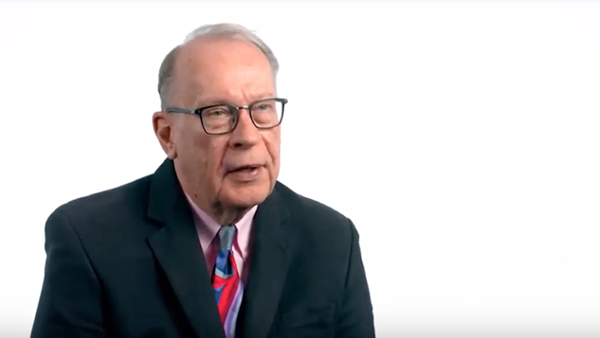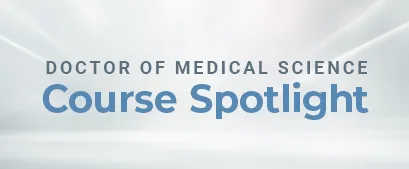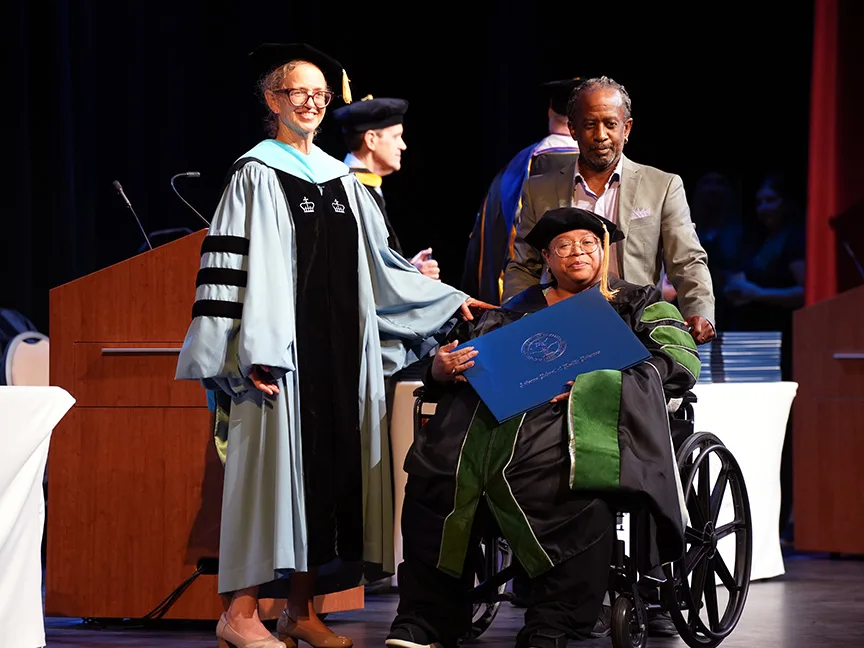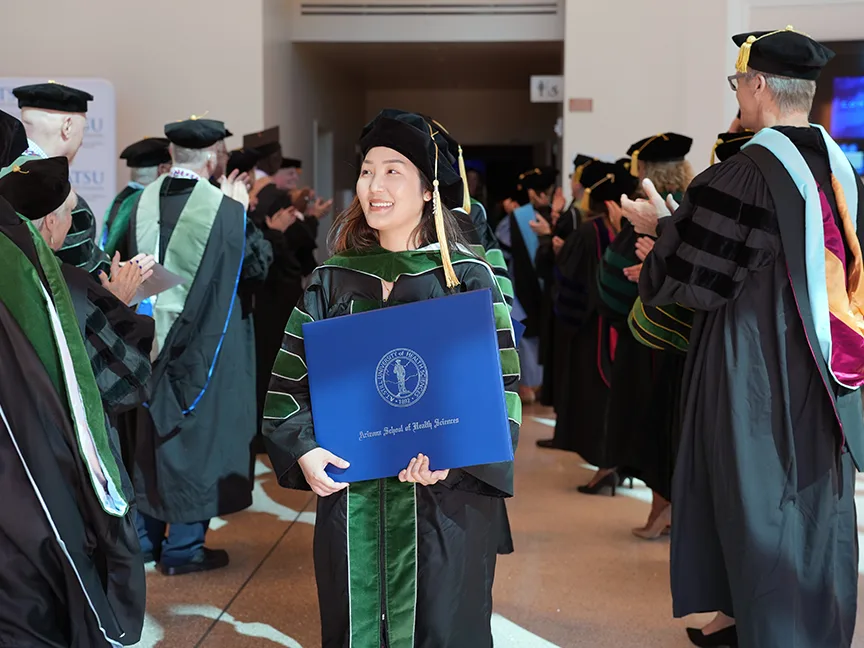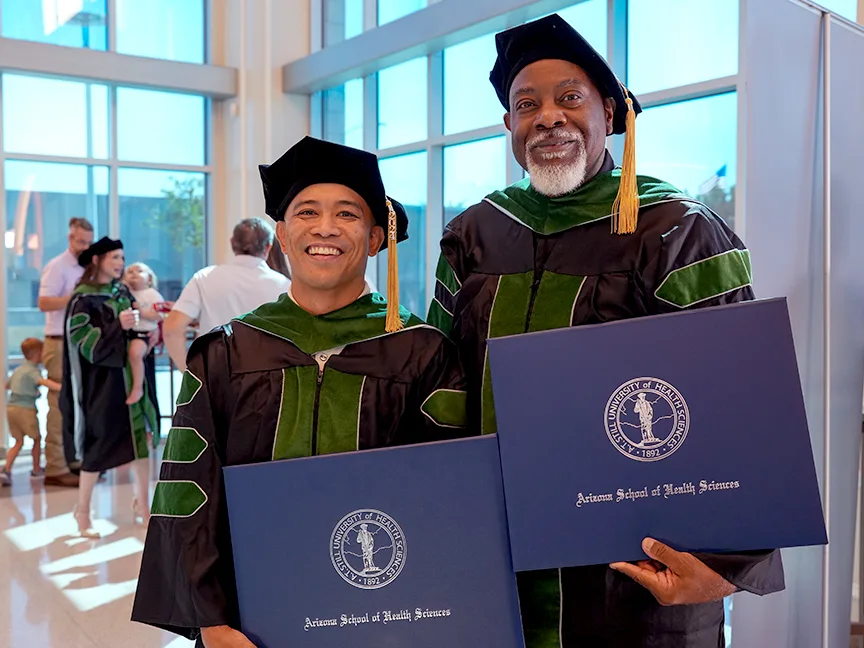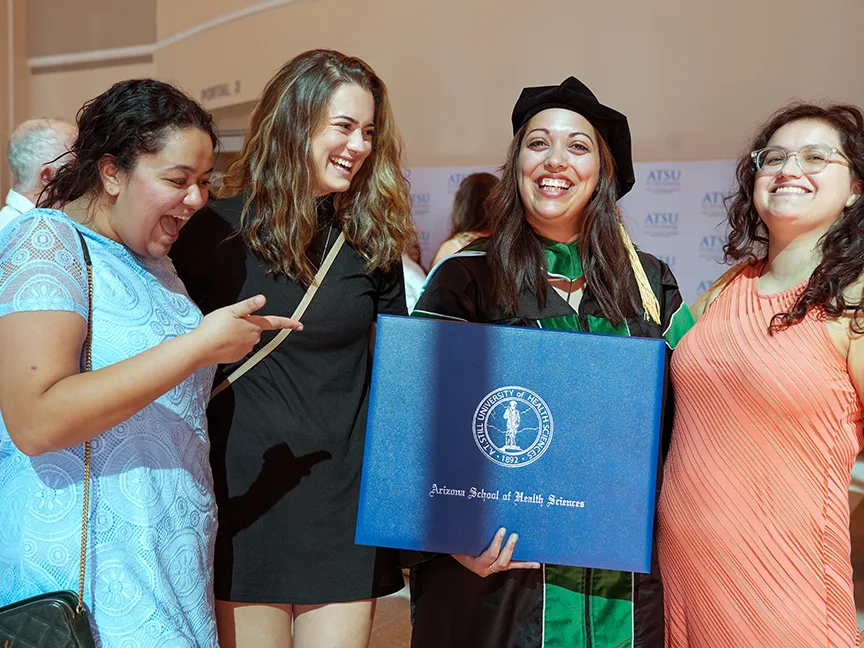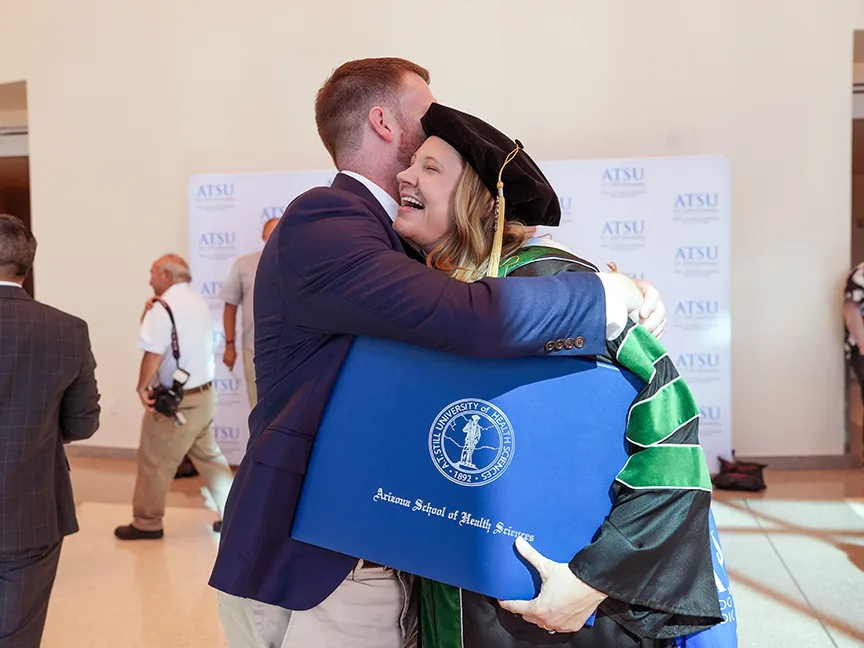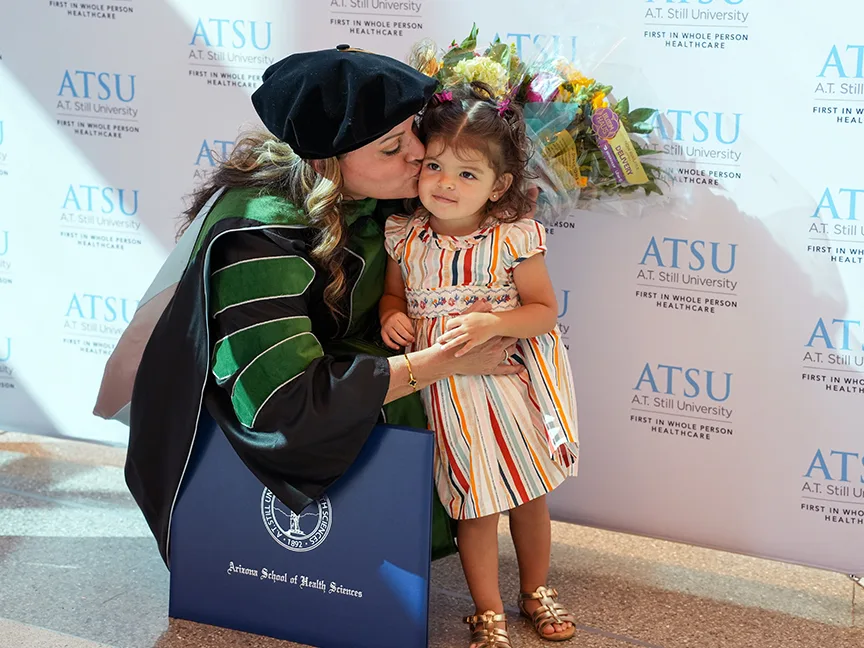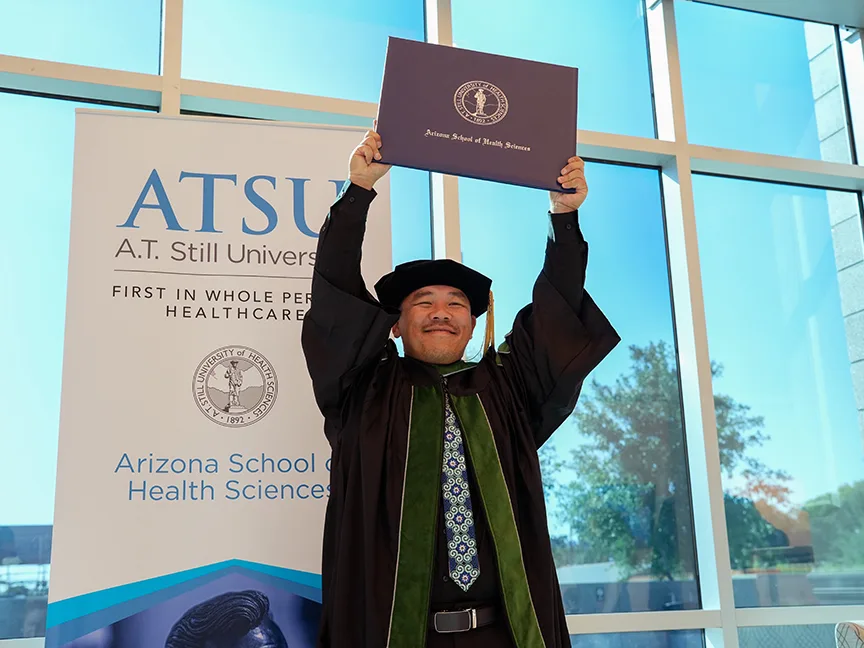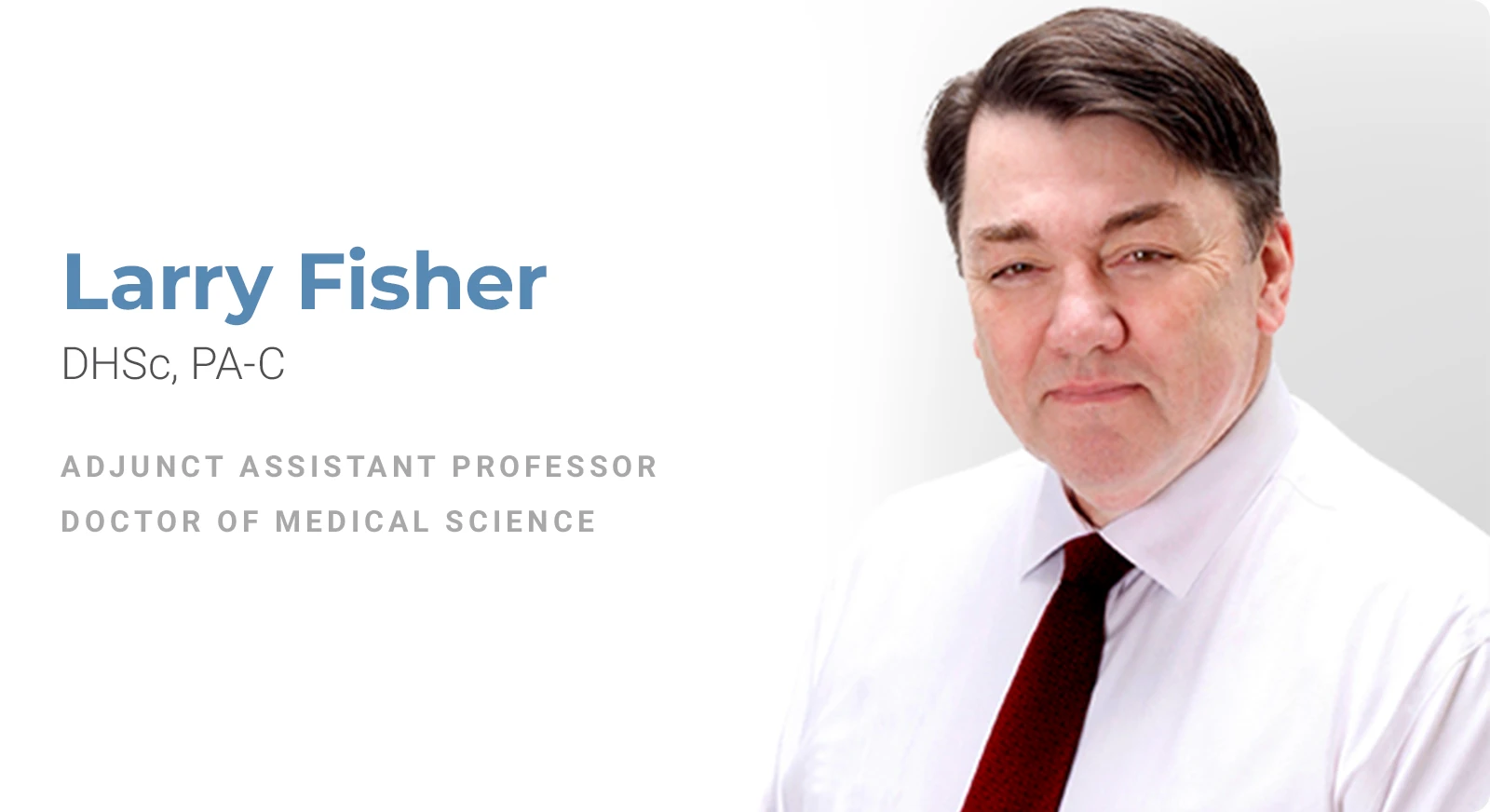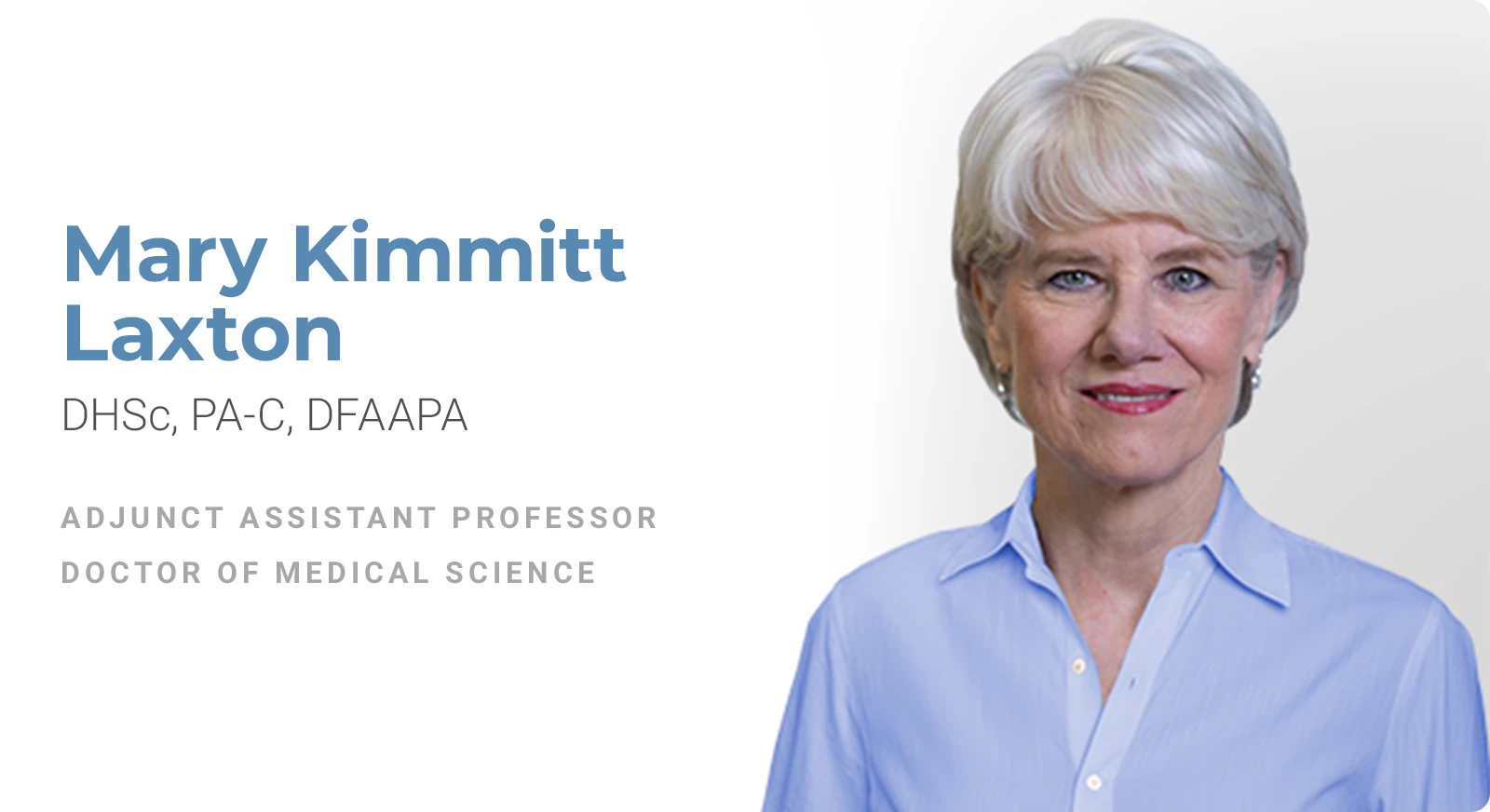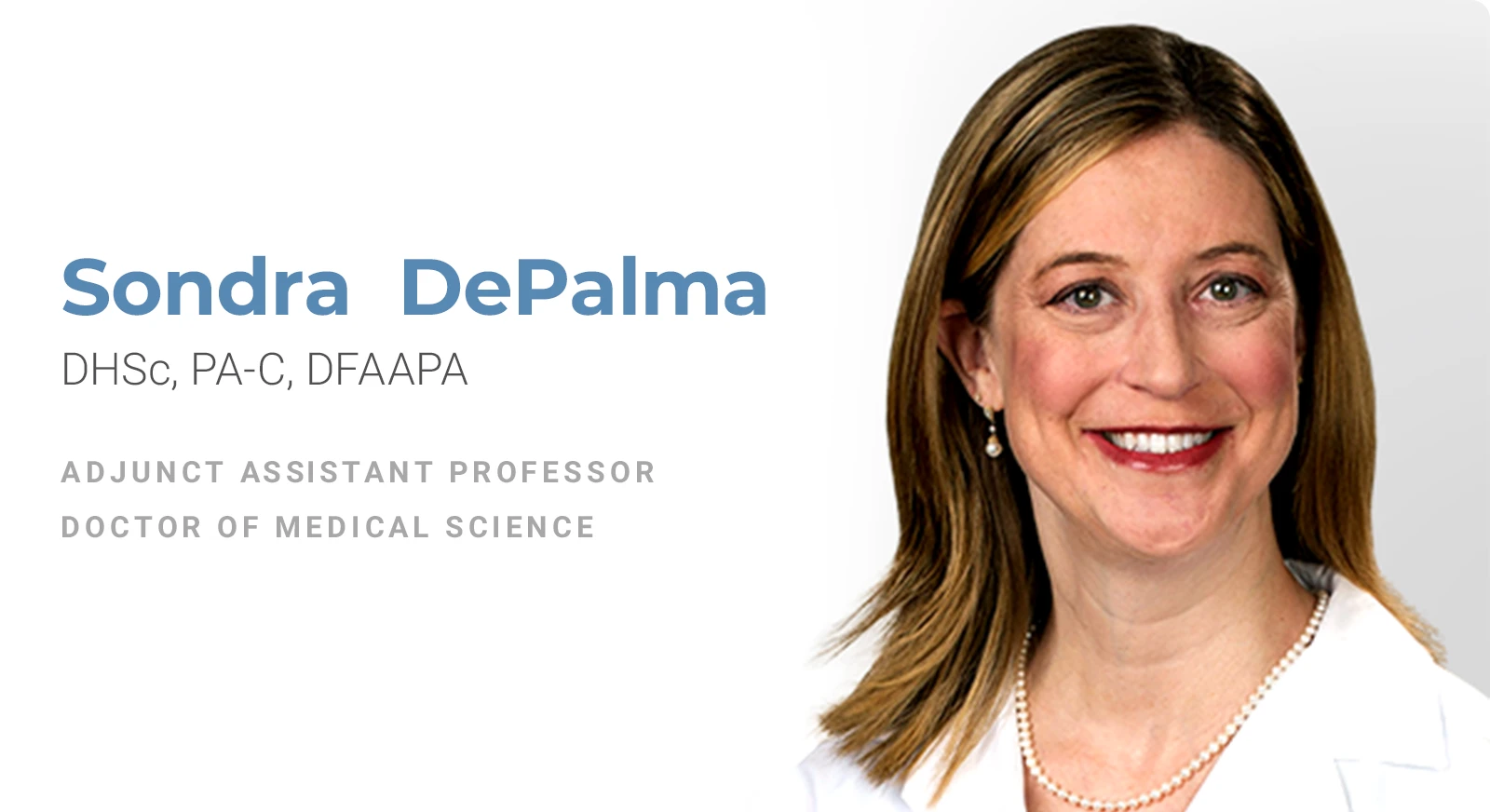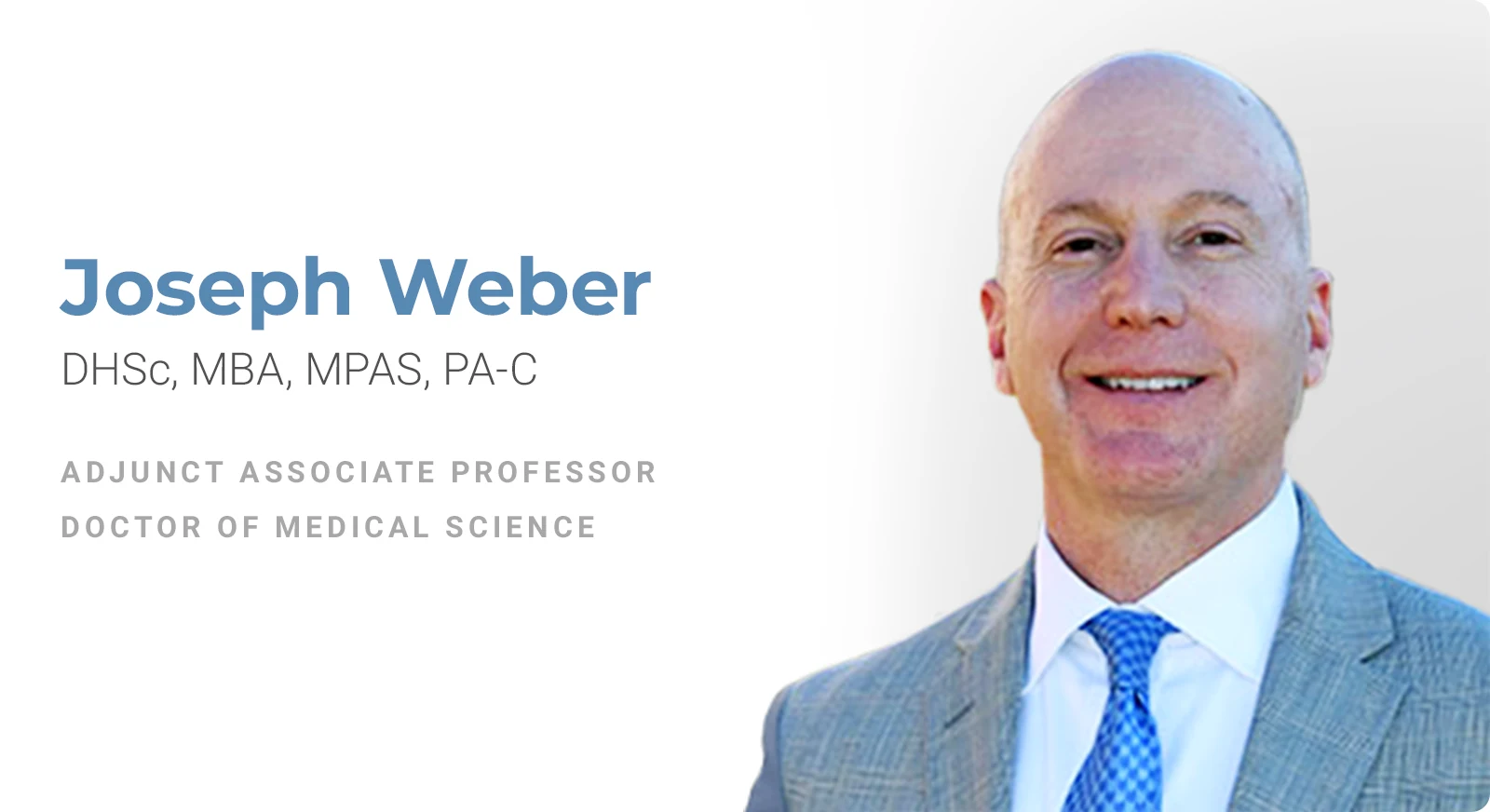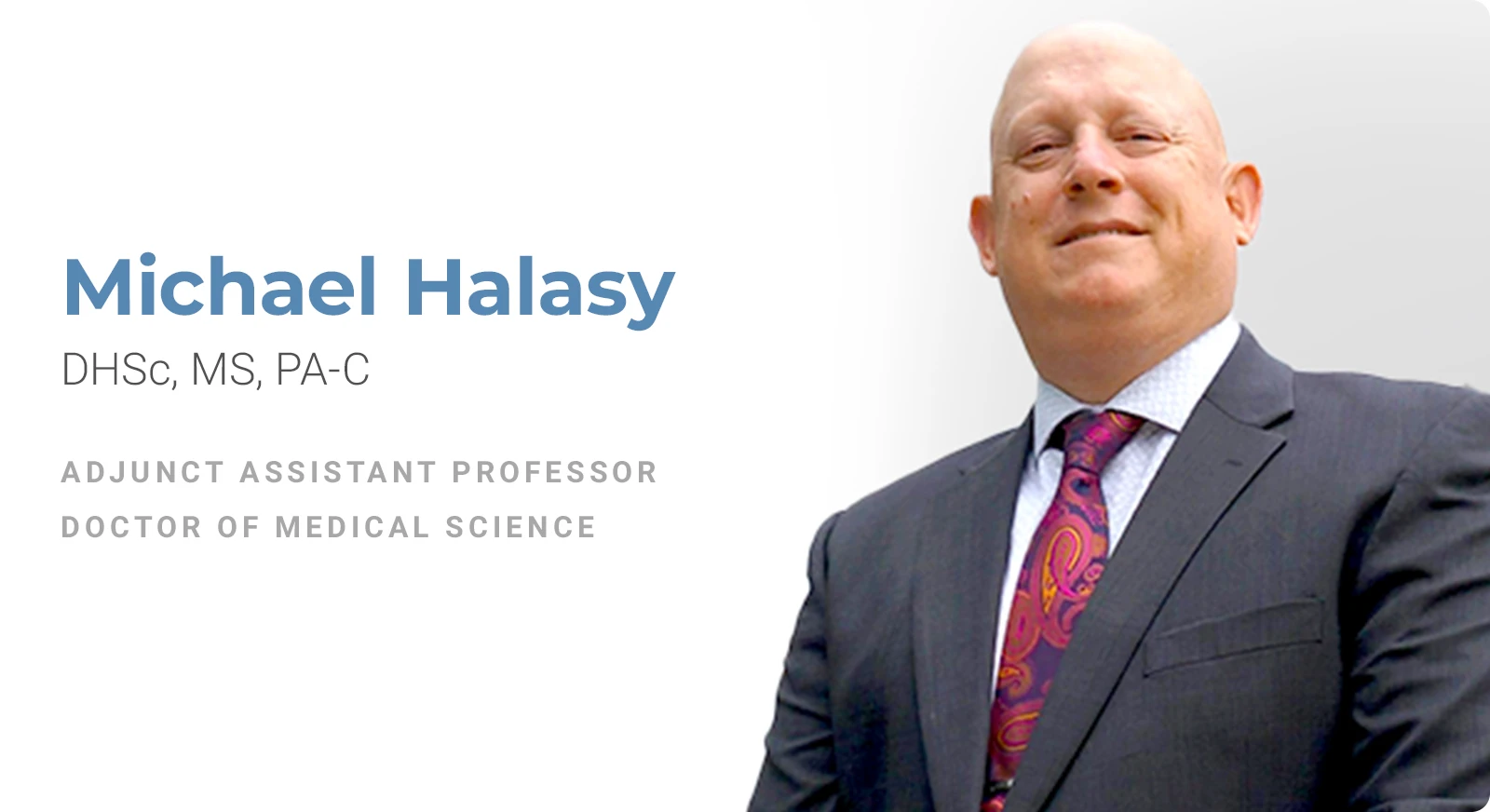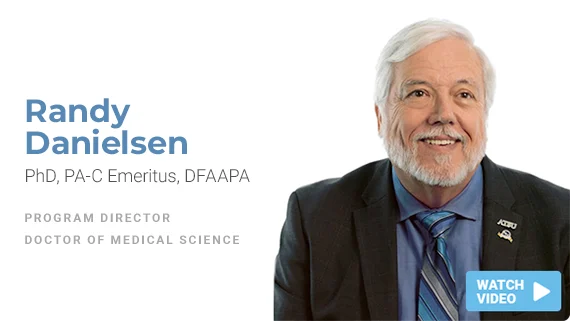QUICK LINKS:
Overview Curriculum Faculty & staff Tuition Admissions Careers & outcomes Student experience FAQs AccreditationDesigned for practicing and retired PAs
The online Doctor of Medical Science (DMSc) program at A.T. Still University is tailored for certified and licensed physician assistants (PAs), including international and retired PAs. The program empowers practicing PAs to advance their careers and become influential leaders capable of shaping the future of healthcare in America. With a fully online, asynchronous learning model, ATSU’s DMSc degree offers maximum flexibility, allowing PAs to continue practicing full-time while earning their doctoral degree, without disrupting their careers.
100% ONLINE
FLEXIBILITY
AFFORDABLE
TUITION & FEES
COMPLETE IN AS
FEW AS 15 MONTHS
EARN AAPA
CATEGORY 1 CMEs
NO ON-CAMPUS
REQUIREMENT
4 START DATES
PER YEAR
Program details
ATSU's prestigious Doctor of Medical Science program is tailored exclusively for practicing and retired physician assistants/associates. This high-quality, 100% online doctorate is designed to elevate PA careers through advanced education.
Key quality features of the ATSU DMSc program include:
- Customizable curriculum: Students can specialize in education, leadership, sports orthopaedics, sports rehabilitation, sports neurology & concussion, global health, emergency preparedness, and public health workforce or create an individualized practicum.
- Comprehensive healthcare focus: Equipping you with an in-depth understanding of contemporary U.S. healthcare challenges. This preparation will empower the doctoral student to lead confidently in their field, addressing the complex issues that define today’s healthcare landscape.
- Flexibility: The entire degree can be earned online without on-campus or clinical hours, allowing working professionals to balance their education with career demands.
- Designed with your time in mind: With the ability to complete the program in just 18–36 months, depending on your selected curriculum, we respect the value of your time. We are committed to helping you quickly advance your expertise and credentials.
- Continuing education value: Participants earn up to 60 AAPA Category 1 CMEs during the program, supporting their ongoing professional development.
- Institutional backing: Offered by ATSU’s Arizona School of Health Sciences, the program benefits from the university’s established reputation in health sciences education.
Flexible curriculum for aspiring leaders
ATSU’s DMSc program is for certified or licensed PAs, including international and retired professionals. It prepares PAs for leadership roles and enhances healthcare delivery. The asynchronous online format allows PAs to continue working full-time while pursuing their degree. For more details about the DMSc program and the University, check the University Catalog.
Curriculum overview:
Core courses: 24
Concentration courses: 12
Total credit hours: 36*
DOWNLOAD CURRICULUM OUTLINEProgram concentrations
PAs in the DMSc program can customize their degree by selecting a concentration in education, leadership, sports orthopaedics, sports rehabilitation, sports neurology & concussion, global health, emergency preparedness, and public health workforce or create an individualized clinical or non-clinical practicum.
Education concentration
The Education track is designed for PAs who are current educators and to advance their skills, or move into education and develop their teaching skills for academic and clinical environments.
Leadership concentration
The Leadership concentration is designed to provide PAs with foundational leadership knowledge focused on healthcare administration, economics, and healthcare policy to advance within healthcare systems.
Professional concentration
The Professional track allows students to customize a clinical learning plan with structured learning experiences to develop additional medical knowledge and skills. The Learning Plan proposal defines the goals and outcomes the learner will achieve by the end of the four-course sequence. The practicum courses provide a blank canvas that allows the student to tailor the Learning Plan to their area of interests. Patient contact hours are not required.
Global Health concentration
This track provides students with an understanding of global health issues, world politics impacting healthcare, and global health ethics in healthcare. Students taking this track will be in class with students from the doctor of health sciences and kinesiology programs.
Public Health, Emergency Preparedness, and Disaster Response concentration
This track will provide students with an understanding of emergency management systems, introduce them to various forms of disasters and public health threats, as well as to various response skills essential to public health. Students who successfully complete this certificate will also earn three FEMA certificates and a certificate in contact tracing. Students taking this track will be in class with students from the doctor of health sciences and public health programs.
Public Health Workforce concentration
This track will provide students with an understanding of public health issues, disparities, and inequalities, along with emergency preparedness and disaster response for healthcare workers.
Sports Orthopaedics concentration
The Orthopaedics concentration provides advanced instruction in the diagnosis, evaluation, and patient care management of patients with orthopaedic conditions. The concentration prepares practitioners with advanced knowledge and skills in specific areas of orthopaedics enhancing the quality and effectiveness of patient care. Courses are taught by the Department of Athletic Training.
Sports Rehabilitation concentration
The Rehabilitation concentration provides advanced instruction in foundations of tissue healing, assessment and correction of movement dysfunction, and considerations for moving from rehabilitation to sport performance. The concentration prepares practitioners with advanced knowledge and skills in specific areas of rehabilitation enhancing the quality and effectiveness of patient care. Courses are taught by the Department of Athletic Training.
Sports Neurology and Concussion concentration
The Sports Neurology and Concussion concentration provides advanced instruction in the diagnosis, assessment, treatment, and management of patients with sport-related concussion and neurological injuries. The concentration prepares practitioners with advanced knowledge and skills in the sub-specialty of sports neurology and concussion. Courses are taught by the Department of Athletic Training.
PA graduate certificates
ATSU’s DMSc program now offers graduate certificates in education and leadership. Students can select three of the education and leadership courses to complete the certificate. Upon later deciding to obtain a doctorate in medical science at ATSU, these graduate certificates will provide advanced standing in the education or leadership concentrations.
Tuition is the same rate as the doctor of medical science degree. DMSc program alumni receive a 20% tuition discount.
PA Post-Professional Certificate in Education
This certificate is designed for PAs who are currently teaching and want to advance their skills; as well as for PAs who are interested in developing teaching skills for clinical and academic environments. Students learn adult learning theory, how to develop and design curriculum, cutting edge advances in educational technology, and understand educational assessments and evaluations.
PROGRAM OVERVIEW LEARN MOREPA Post-Professional Certificate in Leadership
This certificate provides PAs with foundational leadership knowledge that focuses on healthcare administration, economics, and healthcare policies. Students learn skills to lead organizational improvement in healthcare settings, explore topics influencing the markets on the healthcare system, discuss medical and ethical challenges faced in healthcare, human-subjects research, and privacy rights. PAs will also explore the evolving role and challenges of the PA in the healthcare system.
PROGRAM OVERVIEW LEARN MOREEarn CME credits
All DMSc courses are eligible for Category 1 CME credit approved by AAPA. Students can receive a total of 60 AAPA Category 1 CMEs for the entire DMSc program. This activity has been reviewed by the AAPA Review Panel and is compliant with AAPA CME Criteria.
This activity is designated for 60 AAPA Category 1 CME credits. PAs should only claim credit commensurate with the extent of their participation. Approval is valid from 1/1/2024 to 12/13/2026. AAPA reference number: CME-2010374.
* The ATSU semester credit hours were developed in accordance with the HLC policy.
Doctor of Medical Science courses
In addition to the required core courses, PAs in the DMSc program can customize their degree by selecting a concentration in education, leadership, global health, public health emergency preparedness, public health workforce, sports neurology and concussion, sports orthopaedics, sports rehabilitation, or develop an individualized clinical or non-clinical practicum.
Core courses
The core courses for ATSU’s DMSc degree focus on research techniques, writing proficiency, and quality enhancement. These foundational courses lay the groundwork for effective leadership and advanced clinical practice.
3 Credits
This course examines, in practical terms, the elements required for successful publication of a journal article or health policy review. This course encourages good writing skills through choosing better words, writing better sentences, and preparing better tables, graphs, and photographs. All students are required to develop and submit a quality paper that meets the requirements for publication in a peer-reviewed professional or biomedical journal. The learner will demonstrate the ability to effectively organize and structure information in written form.
2 Credits
This course provides doctoral learners with instruction on the use of the Canvas learning management system, Google suite, online meeting technology (i.e. Zoom), an introduction to AMA writing style/formatting, how to use the Still Memorial distance library services, using the University Writing Center, and how to create/update a curriculum vitae. Students also learn effective time management and work:life balance skills to ensure success in the DMSc program.
3 Credits
This course will introduce the Community Health Assessment (CHA) as a key component of evaluating the broader community health improvement process. Students will learn to objectively analyze community health data to identify priority issues, develop and implement effective health promotion strategies, and measure the effect of community health initiatives on a variety of community health indicators. Students will be exposed to current methods for conducting a community needs assessment. Discussions will center on choosing strategies that are culturally sensitive, clinically appropriate, and cost-effective.
3 Credits
This course will serve as an introduction to the social, cultural, behavioral, and economic factors that influence health status and population health interventions. The practitioner will improve insights on populations they have worked with or those they may work with in the future.
3 Credits
This course will describe qualitative, quantitative and mixed methods research methodologies and the proper selection of methodology based on the research question. Additional topics include conducting a peer-reviewed literature review, critical analysis of study results and research methodologies, and ethical considerations in human subject’s research. A variety of data collection and analysis strategies will be reviewed.
3 Credits
This course will include components of The Institute for Healthcare Improvement (IHI) curriculum to prepare students to lead the development and maintenance of quality management in clinical and business settings. Students will develop foundational fluency in methods of healthcare data collection and industry-standard metrics of clinical quality and patient safety. Implementation analysis of quality improvement PDSA cycles, root-cause, and systems analysis will also be reviewed. Through team-based learning, students will explore how quality metrics enable evidence-based clinical and business decision-making.
During the Capstone courses students will create a scoping review and a translational project. DMSC7030: Research Methods is the prerequisite for Capstone 1; where students will learn about scoping reviews. The capstone project must be of sufficient scholarly effort to satisfy the expectation of rigorous, professional, doctoral level work. The capstone project will be designed to target a problem in either clinical practice, the health system, PA education, or the PA professional sphere. During the capstone course sequence, each student will work closely with their facilitator as they progress from conceptualization to completion of the research or translational project.
In Capstone 1, students will:
- Determine DCP topic with guidance from Capstone facilitator
- Create Scoping Review protocol
- Review scholarly writing best practices
- Collaborate with classmates and Capstone facilitator on research oversight
- Engage university resources – Librarian and University Writing Center
In Capstone 2, students will:
- Complete Scoping Review using PRISMA guidelines
- Review evidence-based practices to assess the quality of literature
- Collaborate with classmates and Capstone facilitator for research oversight
- Engage university resources – Librarian and University Writing Center
In Capstone 3, students will
- Review concepts related to translational research and implementation science
- Design translational project
- Conduct blinded peer reviews of classmates’ Scoping Reviews
Capstone I
3 Credits
This three-course series is designed to instruct the learner in the process of developing and conducting an applied research project. The applied research project will be designed to target a problem in either clinical practice, the PA professional sphere, or PA education. During the capstone course sequence, the learner will work closely with their faculty advisor as they progress from conceptualization to completion of the research project. In Capstone I, the learner will apply methods from the Research Design in Healthcare course to develop a proposal for their applied research project. The student will also conduct a literature review around their chosen applied research topic.
Capstone II
2 Credits
This three-course series is designed to instruct the learner in the process of developing and conducting an applied research project. The applied research project will be designed to target a problem in either clinical practice, the PA professional sphere, or PA education. During the capstone course sequence, the learner will work closely with their faculty advisor as they progress from conceptualization to completion of the research project. Capstone II will focus on the collection and analysis of data.
Capstone III
2 Credits
This three-course series is designed to instruct the learner in the process of developing and conducting an applied research project. The applied research project will be designed to target a problem in either clinical practice, the PA professional sphere, or PA education. During the capstone course sequence, the learner will work closely with their faculty advisor as they progress from conceptualization to completion of the research project. Capstone III focuses on the final preparation and submission of a quality product targeted at publication in the healthcare literature or presentation at a state or national level meeting. Each final applied research product will be reviewed and graded by the learner’s faculty advisor.
Concentration courses
With nine different concentrations available, ATSU’s DMSc program enables students to delve deeper into a specific area of interest. This targeted curriculum is designed to prepare graduates for advanced roles and leadership positions in their chosen concentration.
The Education concentration is designed for PAs who are current educators and to advance their skills or move into education and develop their teaching skills for academic and clinical environments. Students can elect to take either DMSC8120 or DMSC8140. At least four courses must be taken in this concentration to complete the degree requirements for the DMSc.
DMSC 8100 - Adult Learning Theory
3 Credits
Effective and efficient teaching requires an understanding of how adults learn. This course examines the learning process, particularly as it differs for adults. Topics include theories of behaviorism, cognitivism, humanism, constructivism, and social and adult learning; major learning style theories; andragogy versus pedagogy; and motivation for learning as it applies to informal and formal education and training. Utilizing this basis, students will examine how to apply these theories to the design, implementation, and assessment process. Pre-requisite; must be taken first.
DMSC 8110 - Curriculum Design & Delivery
3 Credits
This course will introduce students to methods and best practices for medical education curriculum design and prepare students to be conversant in the foundational research literature of education for adult students. Students will design systems-based learning modules within their medical specialty. An introduction to psychometric principles will prepare students to create high-quality assessment items. Pre-requisite for DMSC8120 or DMSC8130.
DMSC 8120 - Educational Technology & Simulation
3 Credits
(Elective) - Computers, simulators, and even smartphones have become ubiquitous in education both in and outside of the classroom. This course will present best practices in utilization of technology in teaching and provide the learner the opportunity to learn course management through an LMS, develop familiarity with audience response technology (e.g., clickers), develop competence in office productivity software for common educational tasks, and explore hardware and software essential to producing asynchronous curriculum delivery and assessment (e.g., webcam, interactive publishing). Simulation is recognized in healthcare education as an effective way to teach and assess skills and behaviors. This course will teach the student how to create high-quality healthcare simulation programs, introduce the research behind simulation best practices, provide students with a template for effective simulation, and give students a basic understanding of the simulation process as it applies to healthcare education. Students may opt to take this course or DMSC8140.
DMSC 8130 - Assessment & Evaluation Methods
3 Credits
This course will describe best practices for measurement and assessment in education. Topics will include the role of measurement and assessment in teaching, instructional goals and objectives, validity and reliability, classroom tests and assessments, standardized tests, and interpretation of assessment scores and norms. Learners will develop instructional objectives, a variety of assessment items and assessment formats, and will construct rating 3 scales, rubrics, and interpret assessment psychometrics.
DMSC 8140 – PA Program Administration
3 Credits
(Elective) - This course will cover programmatic topics relevant to the administration of entry-level PA degree programs. Topics include strategies for leading and teaching diverse learners, budget and financial management and administration, faculty and staff development, recruiting faculty and staff, critical issues in student affairs and legal issues in higher education, foundations of marketing management, program evaluation, strategic planning, and leadership advancement. Students may opt to take this course or DMSC8140.
This concentration provides students with an understanding of global health issues, world politics impacting healthcare, and global health ethics in healthcare. Students taking this concentration will be in class with students from the doctor of health sciences and kinesiology programs.
DMSC 8230 – PAs in Healthcare Policy
3 Credits
This course will explore the evolving role of the PA in the structure of the current U.S. healthcare system; the challenges of access, cost, and quality; and the process of healthcare policy development. The evolution of healthcare reform will be used to illustrate the development of healthcare policy, including the Affordable Care Act (ACA). The impact of the ACA on PA practice, patient healthcare access, cost, and quality and projections for the future of the ACA will be analyzed.
DHSC 8110 – Global Health Issues
3 Credits
This course provides an introduction to important global health issues, including determinants of health, key areas of disease burden, and the role that new health technologies can play in solving these problems. The goal of the course is to expand students’ understanding of the impact of infectious and chronic diseases on the world’s population with particular attention paid to the health status of women, children, and the poor. Students will examine case studies of successful global health interventions to understand features of successful programs. (Course is offered out of the College of Graduate Health Studies)
DHSC 8120 Globalization & World Politics
3 Credits
This course introduces the theoretical and practical issues associated with the radical global processes that are now affecting human life locally and globally. The course emphasizes the political-economic, cultural, institutional, technological, and ecological implications of globalization and allows students to evaluate whether these processes pose opportunities or challenges to individuals, societies, and the global community. (Course is offered out of the College of Graduate Health Studies)
PUBH 5100 Public Health Emergency Preparedness and Disaster Response
3 Credits
This course provides an introduction to the principles and theory of ethics as applied to global health. The course will examine some of the primary theories and principles in healthcare ethics including virtue, deontology, utilitarian, autonomy, justice, beneficence, and nonmaleficence. The course will explore many prominent global health issues and exemplify how greater knowledge and understanding of global ethics is vital to effective and sound decision-making. Topics that will be discussed in the course include ethical issues related to: pandemic preparedness, end of life, human organ transplantation, clinical research in developing countries, human rights, resource allocation, and the effects of globalization on world health. (Course is offered out of the College of Graduate Health Studies)
The Leadership concentration is designed to provide PAs with foundational leadership knowledge focused on healthcare administration, economics, and healthcare policy to advance within healthcare systems.
DMSC 8200 - Organizational Leadership
3 Credits
This course will provide the learner with an understanding of how perceptions and thinking influence behavior in the workplace, and the skills necessary to manage conflict and lead change in teams, organizations, community partnerships, and health initiatives in their role as a physician assistant. Strategies for creative problem solving, communication and improved management practices will be explored.
DMSC 8210 - Health Economics
3 Credits
Economics is a major influence in shaping health policy in the United States. An effective healthcare leader must be fluent with the basic health economic theory to guide their organization. This course will discuss such topics as demand, supply and market equilibrium, scarcity, risk aversion,moral hazard, adverse selection, quality of care and pay for performance to provide the student with a grasp of the market forces on the U.S. healthcare system.
DMSC 8220 - Ethical Considerations in Health Administration
3 Credits
This course will provide an overview of the principles of medical ethics (autonomy, beneficence, and justice) that relate to healthcare. The discussion will review some of the ethical challenges faced in healthcare and health administration, the ethicality of human-subjects research, and the right to privacy and consent to treatment. The responsibilities and boundaries of the patient-healthcare provider relationship and the conflicting demands of providing quality care with limited resources will be addressed, as will the relationship and responsibilities of healthcare providers to society. Case studies will be included to develop ethical reasoning skills applicable to daily practice.
DMSC 8230 - PAs in Healthcare Policy
3 Credits
This course will explore the evolving role of the PA in the structure of the current U.S. healthcare system; the challenges of access, cost, and quality; and the process of healthcare policy development. The evolution of healthcare reform will be used to illustrate the development of healthcare policy, including the Affordable Care Act (ACA). The impact of the ACA on PA practice, patient healthcare access, cost, and quality and projections for the future of the ACA will be analyzed.
The Professional concentration allows students to customize a clinical learning plan with structured learning experiences to develop additional medical knowledge and skills. The Learning Plan proposal defines the goals and outcomes the learner will achieve by the end of the four-course sequence. The practicum courses provide a blank canvas that allows the student to tailor the Learning Plan to their area of interests. Patient contact hours are not required.
DMSC 8400 - Professional Practicum 1
3 Credits
The first in a series of structed practicum experiences to further the student’s professional practice based on their approved Learning Plan (LP). In this course, students will identify and develop target competencies to fulfill the practicum requirements. The approved LP will guide the student throughout the practicum experience.
DMSC 8410 – Professional Practicum 2
3 Credits
The second in a series of structed practicum experiences to further the student’s professional practice based on the approved Learning Plan (LP) established in DMSC8400.
DMSC 8420 - Professional Practicum 3
3 Credits
The third in a series of structed practicum experiences to further the student’s professional practice based on the approved Learning Plan (LP) established in DMSC8400.
DMSC 8430 - Professional Practicum 4
3 Credits
The final course in a series of structed practicum experiences to further the student’s professional practice based on the approved Learning Plan (LP) established in DMSC8400. At the completion of this course, the student should have attained all of the competencies outlined in the LP.
This concentration will provide students with an understanding of emergency management systems, introduce them to various forms of disasters and public health threats, as well as to various response skills essential to public health. Students who successfully complete this certificate will also earn three FEMA certificates and a certificate in contact tracing. Students taking this concentration will be in class with students from the doctor of health sciences and public health programs.
PUBH5000: Introduction to Public Health
3 Credits
This course is a comprehensive introduction to public health within the context of the U.S. healthcare system. Contents include the concept of public health, its problems in the context of social and community factors, its development from a historical perspective, the role and mission of public health organizations, and an overview of current public health concepts, models, and policy. (Course is offered out of the College of Graduate Health Studies)
EPID6100: Epidemiology
3 Credits
This course examines the study of disease in populations from a public health perspective. Topics include research methods, study designs, sampling, data analysis, interpretation of data, and application of findings for public health policy. (Course is offered out of the College of Graduate Health Studies)
SHMG6000: Global Health Issues
3 Credits
Global healthcare is an emerging priority for organizations and governments worldwide because of the impact on international economic stability. Technology, research, and the advancement of healthcare interventions have produced improvements in health outcomes for many. Unfortunately, these advancements have also led to inequalities in health status within and between countries. The world is faced with new challenges such as the potential for pandemics, an aging population, a diminishing healthcare workforce, and the stresses of determining resource allocation. This course explores the many facets of global health to expose the student to the complexity of the concepts that impact healthcare in developing and developed countries. (Course is offered out of the College of Graduate Health Studies) NOTE: This course is ONLY offered in Block 1 of each semester.
PUBH 5100: Public Health Emergency Preparedness and Disaster Response
3 Credits
For years, public health has played a critical role in responding to emergencies and disasters of all kinds. This course examines the roles and responsibilities of public health during a disaster and emergency. You will examine the various types of disasters and emergencies, including bioterrorism, infectious disease outbreaks, and natural disasters, and learn how a response is planned, initiated, and coordinated. This course will also introduce you to emergency preparedness planning and common concepts, principles, terminology, and organizational processes used including the National Response Framework (NRF), Incident Command System (ICS), and the National Incident Management System (NIMS). Students who successfully complete this course will earn three FEMA certifications. (Course is offered out of the College of Graduate Health Studies)
This concentration will provide students with an understanding of public health issues, disparities, and inequalities, along with emergency preparedness and disaster response for healthcare workers. Students must take PUBH5000, EPID6100, and PUBH6800 along with selecting either PUBH5100 or PUBH6100.
PUBH5000: Introduction to Public Health
3 Credits
This course is a comprehensive introduction to public health within the context of the U.S. healthcare system. Contents include the concept of public health, its problems in the context of social and community factors, its development from a historical perspective, the role and mission of public health organizations, and an overview of current public health concepts, models, and policy. (Course is offered out of the College of Graduate Health Studies) (Required course)
EPID6100: Epidemiology
3 Credits
This course examines the study of disease in populations from a public health perspective. Topics include research methods, study designs, sampling, data analysis, interpretation of data, and application of findings for public health policy. (Course is offered out of the College of Graduate Health Studies) (Required course)
PUBH6800: Public Health Disparities, Health Inequalities, and COVID-19
3 Credits
Using the events surrounding the Covid-19 pandemic students will explore the core principles of health disparities and determinants of health. Throughout this course students will examine potential strategies to understand better health disparities and health equity. Students will research complex relationships among race, socioeconomic status, psychosocial and cultural factors and analyze how these relationships influence health outcomes in diverse communities. (Course is offered out of the College of Graduate Health Studies) (required course)
Must select from one of the following electives:
PUBH5100: Public Health Emergency Preparedness and Disaster Response
3 Credits
For years, public health has played a critical role in responding to emergencies and disasters of all kinds. This course examines the roles and responsibilities of public health during a disaster and emergency. You will examine the various types of disasters and emergencies, including bioterrorism, infectious disease outbreaks, and natural disasters, and learn how a response is planned, initiated, and coordinated. This course will also introduce you to emergency preparedness planning and common concepts, principles, terminology, and organizational processes used including the National Response Framework (NRF), Incident Command System (ICS), and the National Incident Management System (NIMS). Students who successfully complete this course will earn three FEMA certifications. (Course is offered out of the College of Graduate Health Studies) (elective course; must take this course or PUBH6100)
NOTE: This course is only offered in Block 2; PUBH6100 is only offered in Block 1
PUBH6100: Identifying Community Health Needs
3 Credits
Needs and capacity assessment strategies are designed for people planning to practice within the fields of public health, health promotion, or health education. Students take an in-depth look at individual, group, and self-directed assessment strategies. This course gives students an opportunity to practice learned skills, decipher what assessments are best for a given situation, and learn how to implement their new skills within their professional environments. (Course is offered out of the College of Graduate Health Studies) (elective course; must take this course or PUBH5100)
NOTE: This course is only offered in Block 1; PUBH5100 is only offered in Block 2
ATRN 7310: Foundations of Sport Neurology
3 Credits
This course is designed to enhance the practitioner’s ability to manage neurological injuries resulting from participation in sports and physical activity. Basic science concepts regarding neurological mechanisms of pain, pathophysiology of neurologic injuries, neurodynamics, and the psychological contributions of pain will be discussed. This course will serve as a foundation to the other courses in the Sports Neurology and Concussion track or graduate certificate program.
ATRN 7320: Diagnosis and Management of Neurologic Conditions in Sport
3 Credits
This course is designed to enhance the student’s knowledge and skills regarding the recognition, assessment, management, and referral of patients who present with neurologic conditions. Specific attention will be placed on understanding red flags for various conditions, diagnostic testing, and appropriate care for various conditions. The course will use a mix of online readings, videos, and discussion forums to foster collaboration among students.
ATRN 7330: Classification and Management of Traumatic Head Injury
3 Credits
This course is designed to expand the student’s understanding of traumatic head injury. The course will span the spectrum of head injury, from catastrophic head injury with internal hemorrhage to mild traumatic brain injury or concussion. Specifics regarding assessment, treatment, and management will be presented. The course will use a mix of online readings, videos, and discussion forums to foster collaboration among students.
ATRN 7340: Assessment and Management of Complex Patients with Concussion
3 Credits
This course will provide a thorough examination of the treatment of patients with complex medical concerns who suffer a concussion. Specific attention will be focused on the patient’s past medical history and comorbid factors and how these may influence the assessment, treatment, and management of head injuries. The course will use a mix of online readings, videos, and discussion forums to foster collaboration among students.
ATRN 7410: Orthopaedic Diagnostic Evaluation
3 Credits
This course is designed to provide the practitioner with advanced knowledge and clinical skills in the pathology, examination, and diagnosis of orthopaedic and sportrelated injuries to the upper and lower extremities, back, and spine. Content is presented with an emphasis on integrating evidence-based practice principles to enhance the student’s clinical decision-making skills in injury evaluation and diagnosis. Focus will be placed on developing clinical reasoning skills to enhance the student’s ability to accurately and efficiently utilize the physical examination and diagnostic tests to evaluate complex orthopaedic conditions, recognize atypical presentations, identify non-orthopaedic conditions presenting as orthopaedic conditions, and recommend and interpret appropriate imaging and laboratory tests.
ATRN 7420: Orthopaedic Management
3 Credits
This course is designed to enhance the practitioner’s ability to effectively manage patients with increasingly complex orthopaedic conditions. Content focuses on management of complex orthopaedic conditions with and without comorbidities and includes the development of prioritized care plans; strategies to maximize long-term, healthrelated quality of life; identifying criteria and plans for safe return to participation; and to maximize sports performance, engaging in patient education. Students will engage in weekly collaborative learning activities and independent assignments to enhance their clinical skills in orthopaedic management.
ATRN 7430: Orthopaedic Imaging and Labs
3 Credits
This course is designed to enhance the practitioner’s knowledge regarding common imaging and laboratory techniques used in the management of orthopaedic patients. Students will be exposed to various imaging modalities, including radiographs, magnetic resonance imaging, CT scans, and musculoskeletal ultrasound. The use of laboratory tests for injury and illness will also be examined. Students will engage in weekly collaborative learning activities and independent assignments to evaluate the sensitivity and utility of imaging and laboratory tests used in athletic healthcare.
ATRN 7440: Orthopaedic Surgical Considerations
3 Credits
This course is designed to enhance the practitioner’s knowledge and awareness of special considerations for rehabilitation following common orthopaedic surgeries. Surgical techniques for common orthopaedic conditions of the upper and lower extremities will be presented. Tissue response to surgery, post-surgical rehabilitation guidelines and timelines, and surgical outcomes will be discussed. Students will engage in weekly collaborative learning activities to critically appraise the current evidence for post-surgical rehabilitation approaches. The course culminates with the development of a comprehensive, evidence-based postsurgical rehabilitation protocol for an orthopaedic surgery of the student’s choice.
ATRN 7210: Foundations of Tissue Healing
3 Credits
This course is designed to enhance the practitioner’s ability to plan and implement a comprehensive sports injury rehabilitation program based on the sequential biological events of connective tissue healing. Orthopaedic basic science concepts involved in clinical assessment, establishment of therapeutic objectives, and selection of therapeutic agents will be addressed. The histology, morphology, and biomechanics of soft connective tissues, muscle, articular cartilage, and peripheral nerves will be presented. Special focus is placed on the relationships between tissue healing physiology and selection of appropriate therapeutic interventions. Current topics in soft tissue healing and rehabilitation, including viscosupplementation, graft ligamentization, and biologic treatment techniques, will be discussed. This course provides the orthopaedic basic science foundation for discussion of therapeutic techniques in future rehabilitation courses.
ATRN 7230: Assessment of Movement Dysfunction
3 Credits
This course introduces and explores the foundational concepts of structure and function as they relate to fundamental patterns of human movement. Neurodevelopmental progression, motor development, motor learning, and motor control concepts will be presented. Utilizing dynamic systems theory and tensegrity models, factors contributing to movement dysfunction will be identified and techniques for movement assessment will be outlined and discussed. Following the completion of this course, students will be able to demonstrate advanced knowledge and skills in the assessment and diagnosis of movement dysfunction.
ATRN 7240: Corrective Techniques for Movement Dysfunction
3 Credits
This course provides the practitioner with advanced knowledge in the rehabilitation of orthopaedic injuries by utilizing corrective techniques to restore movement patterns and function. Emphasis is placed on integration of tensegrity and dynamic systems models to develop a sequential and progressive rehabilitation program, centered on restoration of movement patterns in fundamental, transitional, and functional postures. Concepts of mobility, sensorimotor control, movement patterning, and neurodevelopmental progression will be studied. Assisted, active, and reactive techniques for improving mobility, stability, and movement will be taught.
ATRN 7250: Rehabilitation Considerations for Sport Performance
3 Credits
This course provides the practitioner with the advanced knowledge on how to bridge the gap from rehabilitation to sport performance. Neuromuscular considerations, such as psychomotor and somatosensory control, will be explored. Considerations for strength training, time under tension, power development, and athletic movement prescription will be examined. Following this course, the practitioner will be able to develop a comprehensive program for the athlete who is returning to sport post-injury.
Industry leading DMSc faculty
ATSU’s PA program has a robust, time-proven curriculum for both residential and online PA programs with a strong faculty experienced in the online delivery of instruction. ATSU’s PA department currently employs doctorly trained faculty. These faculty have received graduate degrees through online education, and have taught online courses at both the graduate and undergraduate level.
Hear from our leadership and faculty
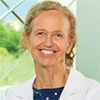
Dr. Ann Lee Burch is the dean of A.T. Still University’s Arizona School of Health Sciences (ATSU-ASHS). Dr. Burch received her doctor of education from Columbia University, Teachers College in 2005. She received her masters of public health from Columbia University, Mailman School of Public Health in 2002 and her masters of physical therapy from Columbia University, College of Physicians and Surgeons in 1989. She was a postdoctoral fellow with the Research Group on Health Disparities at Teachers College, Columbia University. Her BA is in psychology from the University of Rochester.
Prior to her appointment as dean, Dr. Burch served as vice dean for ATSU-ASHS. She served as the chair of the Physical Therapy Department from 2008-January 2012. Prior to ATSU, Dr. Burch was the director of physical therapy at the University of Puerto Rico, Medical Sciences Campus in San Juan, Puerto Rico. She has held administrative and/or faculty positions at the International Center for the Disabled in NY, NY, Mercy College in NY, and Long Island University in Brooklyn, NY.
Dr. Burch’s area of scholarly interest and application of that interest is in knowledge, attitudes, and self-efficacy of health care providers and healthcare professional students towards underrepresented patient/client groups.
Dr. Burch is the author of a Guide to Physical Therapy (Vault Publishers) which was written to increase information access about physical therapy to both high school graduates and re-entry adults. She was a co-investigator on an NIH grant at the University of Puerto Rico exploring the feasibility of an exercise program for breast cancer survivors living in San Juan. Dr. Burch has lived in Symi, Greece, Taipei, Taiwan, Ahmedabad, India and San Juan, Puerto Rico, and is committed to research, teaching, and service that further the understanding of the impact of socioeconomic and cultural variables on health.
She was a member of the class of 2014 cohort of Women in Educational Leadership at Harvard Graduate School of Education. In 2017 she was the co-PI on a Centers for Disease Control, Association for Prevention and Teaching grant exploring a population health case study format for teaching and communicating the impact of social determinants of health on health disparities. She was recently appointed a peer reviewer for the Higher Learning Commission.

Albert (Bert) Simon, DHSc, MEd, PA, is the former chair and current professor in the Department of Physician Assistant Studies at A.T. Still University’s Arizona School of Health Sciences (ATSU-ASHS). Previously, he served as founding vice dean at ATSU’s School of Osteopathic Medicine in Arizona (ATSU-SOMA), where he was also chief operating officer for ATSU-SOMA. He was an integral part of the leadership team that developed the most innovative medical school in the U.S. from 2007-2012. For 37 years, Dr. Simon has served as chair of physician assistant studies departments at three universities: Saint Francis University, Baylor College of Medicine, and most recently ATSU. During his years as chair at Saint Francis University, their physician assistant program was the only non-medical school-based program ranked in the top ten physician assistant programs in the U.S. by U.S. News and World Report in every ranking poll.
In his years of clinical practice, he has worked in occupational medicine at Volkswagen of America’s assembly plant in New Stanton, Pennsylvania, and inpatient internal medicine at the Van Zantz Veterans Affairs Medical Center in Altoona, Pennsylvania, as well as working family medicine in the Coalport Area Community Health Center. Being politically active in the physician assistant profession, he has served in a number of national leadership positions including president and vice president of the Association of Physician Assistant Programs (APAP) and author of the Annual Report on Physician Assistant Educational Programs in the U.S. During his APAP presidency, he founded the Leadership-Training Institute as a vehicle to provide needed education to individuals entering into PA education. He has served as an educational consultant to over 25 physician assistant programs across the U.S. He has also served as the co-editor of Appleton and Lange’s Q and A for the Physician Assistant, one of the best selling board review books for physician assistants in the nation.
With an interest in continuous quality improvement, Dr. Simon was trained as a Malcolm Baldrige National Quality Award Examiner for the United States Department of Labor. He was also featured in the book On Q, Causing Quality in Higher Education by Daniel Seymour for his innovative approaches to quality management in an educational program.
Dr. Simon resides in the picturesque mountain community of Ligonier, Pennsylvania, with his wife and two dogs (Allie and Cole).

Marlene Salas-Provance, PhD, MHA, CCC-SLP
Vice Dean
Dr. Salas-Provance, is professor and vice dean of A.T. Still University’s Arizona School of Health Sciences (ATSU-ASHS). Dr. Salas-Provance received her doctorate in speech science from the University of Illinois Urbana-Champaign. She received her masters of health administration from the University of Missouri School of Medicine-Columbia. She holds both a bachelors and masters in Speech Pathology from New Mexico State University.
Prior to her appointment as vice dean, Dr. Salas-Provance served as associate dean of academic and student affairs for the School of Health Professions at the University of Texas Medical Branch Galveston. She served as assistant dean and chair in the College of Education, Department of Special Education and Communication Disorders at New Mexico State University in Las Cruces, New Mexico and department chair in the Department of Communication Sciences and Disorders at the University of Montevallo (AL). She held faculty positions at Fontbonne College and St. Louis University, in St. Louis, MO.
She has made extensive professional contributions to the American, Speech, Language & Hearing Association (ASHA), serving on the Speech-Language Pathology Advisory Council, member of the Financial Planning Board, and the Multicultural Issues Board. She served as coordinator of ASHA’s Special Interest Group (SIG) 14, Communication Disorders and Sciences in Culturally and Linguistically Diverse populations and was a founding member and coordinator of SIG 17, Global Issues in Communication Sciences and Disorders. She is an ASHA Fellow and received ASHA’s highest awards for “Special Recognition in Multicultural Affairs” and “Outstanding Contributions in International Achievement.”
Dr.Salas-Provance has served as a clinical educator throughout her academic career, especially related to children with cleft lip and palate. She is a member of an international medical team with Rotaplast International and has traveled worldwide for over 15 years to provide clinical services to children with cleft palate. She implemented a program for graduate students in speech pathology to provide clinical services in Spanish to children with cleft palate in Lima, Peru. In addition to Lima, Peru she has provided clinical services in China, Bangladesh, Philippines, El Salvador, Dominican Republic, Guatemala and Venezuela.
Dr. Salas-Provance is coauthor of the textbook Culturally Responsive Practices in Speech-Language and Hearing Science (Plural Publishing, 2019) which meets the needs for training students in healthcare professions regarding practice with individuals from culturally and linguistically diverse populations. Her research is focused on attitudes towards disability by diverse populations and addressing the use of language interpreters during healthcare and educational encounters.
Over the past ten years she has lectured extensively to international audiences, both in English and Spanish, including as invited speaker for the Congreso Internacional en Trastornos de la Comunicacion at Escuela de Fonoaudiologia (Speech Language Pathology / Audiology) de la Universidad de Talca, Chile and for the Department of Otolaryngology, Hospital Nacional Arzobispo Loayza, Lima, Peru, Endoscopic Evaluation of Velopharyngeal Dysfunction. She was invited keynote speaker for the First International Congress in Speech-Language Pathology and Orthodontics in the area of cleft lip and palate in Lima, Peru.
Dr. Salas-Provance was selected for the American Council on Education (ACE) Women’s Leadership Program and attended the National Women’s Leadership Forum in Washington DC (2017) for advancing female executives in higher education.

Jerica N. Derr, DMSc, MPAS, PA-C
Associate Director of Capstone & Research Activities
Jerica N. Derr, DMSc, PA-C is the Associate Director of Capstone and Research Activities for the ATSU DMSc program. She is originally from Indianapolis, IN. She completed her undergraduate training in Biology at Indiana Wesleyan University, a Master in Biology from Purdue University, and a Master of Physician Assistant Studies from Chatham University. After practicing medicine for several years, she transitioned to physician assistant (PA) education and obtained her Doctor of Medical Science in PA Education and a Graduate Certificate in Healthcare Administration & Management from the University of Lynchburg. Dr. Derr has also been the Director of Clinical Education and Assistant Professor at the Charleston Southern University PA Program since 2018.
Dr. Derr’s clinical background is in integrative pain management, urogynecology, and hospital medicine. Her educational and research focus is on clinical education and experiential learning, specifically in the area of utilizing gamification in education. She is passionate about enhancing engagement and optimizing the student experience while cultivating an environment of self-directed learning and lifelong curiosity. She is an active member of the American Academy of Physician Assistants, the Physician Assistant Education Association, and the South Carolina Association of PAs where she serves as the regional representative for the Lowcountry. Dr. Derr advocates for PAs at a local, state, and national level to improve patient access to care through PA practice optimization.

Dr. Danielsen is the director of the Doctor of Medical Science (DMSc) program. Since graduating from the University of Utah Physician Assistant (PA) Program in 1974, Dr. Danielsen has distinguished himself as a clinician, PA educator, author, and editor. He received his BS in Health Science (cum laude) from the University of Utah in 1978, his Masters in PA Studies (MPAS) from the University of Nebraska with an emphasis on Internal Medicine in 1997, and his Ph.D. from the Union Institute & University in 2003 with an emphasis on Medical Education. He has been with A.T. Still University for over two decades as PA academic coordinator (1995-1997), chair of physician assistant studies (1997-2004), dean of the Arizona School of Health Sciences (2004-2010, 2012-2018) and recently stepped down as dean to take on the new role with the DMSc.
He has served on the board of directors of the American Academy of Physician Assistants (AAPA) and as a board member and chairman for National Commission on Certification of Physician Assistants. Earlier in his career, he served as president of the Utah Academy of Physician Assistants (UAPA), the Arizona State Association of Physician Assistants (ASAPA), and as chair of the Arizona Regulatory Board for PAs. Retired after 28 years of service in the US Air Force and Army National Guard with the rank of Lieutenant Colonel, Dr. Danielsen also is a former president of the AAPA Veterans Caucus and was honored with the Caucus’ Civilian PA of the Year Award in 2003. Dr. Danielsen was named Outstanding PA of the Year by the AAPA in 1993 and by ASAPA in 2011. In 2012 he was honored by the University of Utah, School of Medicine, Department of Family & Preventive Medicine, Division of Physician Assistant Studies with the “Patron of the Profession” award for “unwavering dedication and service to the Physician Assistant Profession.” In May 2015 he received the Eugene A. Stead Award of Achievement by the AAPA. This is the Academy’s most prestigious award recognizing an individual for lifetime achievement that has had a broad and significant impact on the profession.
He currently serves as PA editor-in-chief for Clinician Reviews. Dr. Danielsen has published over nineteen peer-reviewed articles, twenty journal editorials, three book chapters, and his first co-authored book, entitled The Preceptor’s Handbook for Supervising Physician Assistants, published by Jones & Bartlett Learning. He is also a Senior Consultant with the Academy for Academic Leadership and a proud member of Rotary International.

Dr. Danielsen is the director of the Doctor of Medical Science (DMSc) program. Since graduating from the University of Utah Physician Assistant (PA) Program in 1974, Dr. Danielsen has distinguished himself as a clinician, PA educator, author, and editor. He received his BS in Health Science (cum laude) from the University of Utah in 1978, his Masters in PA Studies (MPAS) from the University of Nebraska with an emphasis on Internal Medicine in 1997, and his Ph.D. from the Union Institute & University in 2003 with an emphasis on Medical Education. He has been with A.T. Still University for over two decades as PA academic coordinator (1995-1997), chair of physician assistant studies (1997-2004), dean of the Arizona School of Health Sciences (2004-2010, 2012-2018) and recently stepped down as dean to take on the new role with the DMSc.
He has served on the board of directors of the American Academy of Physician Assistants (AAPA) and as a board member and chairman for National Commission on Certification of Physician Assistants. Earlier in his career, he served as president of the Utah Academy of Physician Assistants (UAPA), the Arizona State Association of Physician Assistants (ASAPA), and as chair of the Arizona Regulatory Board for PAs. Retired after 28 years of service in the US Air Force and Army National Guard with the rank of Lieutenant Colonel, Dr. Danielsen also is a former president of the AAPA Veterans Caucus and was honored with the Caucus’ Civilian PA of the Year Award in 2003. Dr. Danielsen was named Outstanding PA of the Year by the AAPA in 1993 and by ASAPA in 2011. In 2012 he was honored by the University of Utah, School of Medicine, Department of Family & Preventive Medicine, Division of Physician Assistant Studies with the “Patron of the Profession” award for “unwavering dedication and service to the Physician Assistant Profession.” In May 2015 he received the Eugene A. Stead Award of Achievement by the AAPA. This is the Academy’s most prestigious award recognizing an individual for lifetime achievement that has had a broad and significant impact on the profession.
He currently serves as PA editor-in-chief for Clinician Reviews. Dr. Danielsen has published over nineteen peer-reviewed articles, twenty journal editorials, three book chapters, and his first co-authored book, entitled The Preceptor’s Handbook for Supervising Physician Assistants, published by Jones & Bartlett Learning. He is also a Senior Consultant with the Academy for Academic Leadership and a proud member of Rotary International.
Dr. Danielsen teaches Medical Writing, Quality Improvement in Healthcare, and PAs in Healthcare Policy.

Albert (Bert) Simon, DHSc, MEd, PA, is the former chair and current professor in the Department of Physician Assistant Studies at A.T. Still University’s Arizona School of Health Sciences (ATSU-ASHS). Previously, he served as founding vice dean at ATSU’s School of Osteopathic Medicine in Arizona (ATSU-SOMA), where he was also chief operating officer for ATSU-SOMA. He was an integral part of the leadership team that developed the most innovative medical school in the U.S. from 2007-2012. For 37 years, Dr. Simon has served as chair of physician assistant studies departments at three universities: Saint Francis University, Baylor College of Medicine, and most recently ATSU. During his years as chair at Saint Francis University, their physician assistant program was the only non-medical school-based program ranked in the top ten physician assistant programs in the U.S. by U.S. News and World Report in every ranking poll.
In his years of clinical practice, he has worked in occupational medicine at Volkswagen of America’s assembly plant in New Stanton, Pennsylvania, and inpatient internal medicine at the Van Zantz Veterans Affairs Medical Center in Altoona, Pennsylvania, as well as working family medicine in the Coalport Area Community Health Center. Being politically active in the physician assistant profession, he has served in a number of national leadership positions including president and vice president of the Association of Physician Assistant Programs (APAP) and author of the Annual Report on Physician Assistant Educational Programs in the U.S. During his APAP presidency, he founded the Leadership-Training Institute as a vehicle to provide needed education to individuals entering into PA education. He has served as an educational consultant to over 25 physician assistant programs across the U.S. He has also served as the co-editor of Appleton and Lange’s Q and A for the Physician Assistant, one of the best selling board review books for physician assistants in the nation.
With an interest in continuous quality improvement, Dr. Simon was trained as a Malcolm Baldrige National Quality Award Examiner for the United States Department of Labor. He was also featured in the book On Q, Causing Quality in Higher Education by Daniel Seymour for his innovative approaches to quality management in an educational program.
Dr. Simon resides in the picturesque mountain community of Ligonier, Pennsylvania, with his wife and two dogs (Allie and Cole).

Jeffrey L. Alexander, PhD, FAACVPR, ACSM-CEP
Associate Professor
Jeffrey Alexander, PhD, FAACVPR, ACSM-CEP is adjunct faculty in ATSU’s Doctor of Medical Science program and Associate Professor with the College of Graduate Health Studies.
Dr. Alexander has been with A.T. Still University (ATSU) since 2006 serving in various roles. In addition to serving as an inaugural adjunct faculty member of the Doctor of Medical Sciences in the Arizona School of Health Sciences, Dr. Alexander serves as an Associate Professor in the Doctor of Health Sciences Program and adjunct faculty for the Master’s in Kinesiology Program in the College of Graduate Health Studies. He is a founding member and associate researcher of ATSU’s Center for Resilience and Aging. His principal teaching responsibilities at the University include instruction and facilitation of doctoral student research, and exercise science specific to older adults.
Dr. Alexander’s research interests focus on improving the health and well-being of older adults. He is a Lead Trainer for the Matter of Balance (MOB) falls prevention program. He co-founded the Still Standing Falls Prevention Outreach Program at A.T. Still University which has trained hundreds of graduate health professions students as Coaches in MOB, and these students have delivered the MOB program to thousands of older adults in the Phoenix-Metropolitan area since 2009.
Dr. Alexander is a Fellow of the American Association of Cardiovascular and Pulmonary Rehabilitation and serves on the Association’s Research Committee. He is an Associate Editor for the American Journal of Health Promotion and has published in various peer-reviewed journals and presented at local and national meetings and conferences. Dr. Alexander teaches Capstone I, II, and III.

Sondra DePalma, DHSc, PA-C, CLS, CHC, FNLA, AACC, DFAAPA is an adjunct assistant professor in ATSU’s Doctor of Medical Science program.
Dr. DePalma is the Director of Regulatory and Professional Practice at the American Academy of PAs, where she oversees PA regulations, policies, and reimbursement. She has experience in healthcare leadership and organizational management, is a published author, and a regular speaker at national conferences. Dr. DePalma continues to practice clinically in cardiology, a field in which she has worked for nearly 20 years and has earned advanced certifications in lipidology and hypertension management.
She earned a Doctor of Health Sciences degree with a concentration in Leadership and Organizational Behavior from ATSU and has a graduate certificate in the Science of Healthcare Delivery from Arizona State University. She graduated with a Master of Health Science degree from Lock Haven University’s Physician Assistant Program, received a post-baccalaureate premedical certificate from Pennsylvania State University, and graduated summa cum laude with a BA from Mercyhurst University.
Dr. DePalma teaches Social Determinants of Health and Quality Improvement in Healthcare.

Jerica N. Derr, DMSc, MPAS, PA-C
Associate Director of Capstone & Research Activities
Jerica N. Derr, DMSc, PA-C is the Associate Director of Capstone and Research Activities for the ATSU DMSc program. She is originally from Indianapolis, IN. She completed her undergraduate training in Biology at Indiana Wesleyan University, a Master in Biology from Purdue University, and a Master of Physician Assistant Studies from Chatham University. After practicing medicine for several years, she transitioned to physician assistant (PA) education and obtained her Doctor of Medical Science in PA Education and a Graduate Certificate in Healthcare Administration & Management from the University of Lynchburg. Dr. Derr has also been the Director of Clinical Education and Assistant Professor at the Charleston Southern University PA Program since 2018.
Dr. Derr’s clinical background is in integrative pain management, urogynecology, and hospital medicine. Her educational and research focus is on clinical education and experiential learning, specifically in the area of utilizing gamification in education. She is passionate about enhancing engagement and optimizing the student experience while cultivating an environment of self-directed learning and lifelong curiosity. She is an active member of the American Academy of Physician Assistants, the Physician Assistant Education Association, and the South Carolina Association of PAs where she serves as the regional representative for the Lowcountry. Dr. Derr advocates for PAs at a local, state, and national level to improve patient access to care through PA practice optimization.

Larry Fisher, DHSc, PA-C, is an adjunct assistant professor with the Doctor of Medical Science (DMSc) program.
Dr. Larry Fisher was born in Fairbanks, Alaska and is a graduate of the MEDEX PA program, Alaska Class # 1 in 1995. After practicing in Alaska for 17 years, Dr. Fisher relocated to Arizona and entered the APA Program. Following graduation, he entered the DHSc program and graduated in 2017 while continuing to practice Family Medicine, Urgent Care, and Pain Management. As a clinic preceptor Dr. Fisher enjoys participating in PA education, and in 2017 began teaching bioethics to APA students at ATSU. Dr. Fisher was invited and accepted an invitation to teach Ethical Considerations in Health Administration in the DMSc program.
Dr. Fisher is a member of AAPA, and ASAPA. He volunteers at an inner-city clinic for the underserved and underinsured on a seasonal schedule. He now resides in Phoenix, Arizona with his wife, son, cats, and dogs. His hobbies include cycling, supporting renewable energy, and brewing his own mead (honey wine). He plans to eventually return to Alaska to enjoy the wide-open spaces, fresh fish, and pioneer spirit.
Dr. Fisher teaches Ethical Considerations in Health Administration, Capstone I, II, and III.

Melinda Moore Gottschalk, DMSc, PA-C
Assistant Professor
Dr. Gottschalk graduated from the University of Texas Southwestern PA program in 1992. She received a Master of PA Studies from the University of Texas Rio Grande Valley in 2016 and earned a Doctor of Medical Science degree at A.T. Still University in June 2021. Her original research, "Ageism in the PA Profession: An exploratory study," earned Dr. Gottschalk AAPA's Research in Action and AT Still's Capstone of Excellence in 2021.
Since beginning her career as a PA, Dr. Gottschalk has practiced in orthopedic sports medicine, orthopedic spine surgery, urgent care, interventional pain management, telemedicine, and neurology-migraine emphasis. Dr. Gottschalk served five years on an FDA advisory panel and was elected to two terms as Director at Large on the American Academy of PA's (AAPA) Board of Directors. She has been appointed to various AAPA national positions, is active in the AAPA's House of Delegates, and is a Distinguished Fellow of AAPA. Dr. Gottschalk is a medical science liaison and adjunct faculty at the University of Mary Hardin Baylor.
Dr. Gottschalk is the current Legislative Affairs Chair for the Texas Academy of PAs (TAPA). She has served in numerous elected and appointed positions within TAPA and was elected President in 2008. Dr. Gottschalk was appointed to the Texas Physician Health Program as the founding PA board member before her current appointed position as Secretary of the Texas PA Regulatory Board. Dr. Gottschalk remains committed to her career-long goal of promoting the PA profession through leadership, advocacy, education, and mentorship.
Dr. Gottschalk is teaching the Capstone courses.

Michael Halasy, DHSc, MS, PA-C is an adjunct Assistant Professor with the Doctor of Medical Science (DMSc) program.
Dr. Michael Halasy is a practicing physician assistant at Mayo Clinic in the Spine Center where he manages an independent panel of complex spine patients from all over the world. He is an accomplished researcher and educator and is currently the co-chair of the multidisciplinary spine research committee at Mayo Clinic and is a health services researcher who works on health workforce research with a number of specialties and practices. He is heavily involved in healthcare administration as well. He was one of only 5 US researchers invited to the first international research collaborative on Audit and Feedback research. He has published numerous articles, has a background in health policy and healthcare economics, and has research interests in shared decision making, healthcare workforce studies, health economics, and organizational behavior. He has a Doctor of Health Sciences degree in Organizational Science and Behavior.
Dr. Halasy teaches Research Methods in Healthcare, Capstone I, II, and III.

Mary Kimmitt Laxton, DHSc, PA-C, DFAAPA, is adjunct assistant professor of ATSU’s Doctor of Medical Science (DMSc) program.
Dr. Laxton received her BA in botany from Duke University in 1976 and her MPA in management from the Indiana University Northwest in 1980. She received her certificate in physician assistant studies from the Philadelphia University in 1997 and her doctor of health science from Nova Southeastern University in 2016. She is a distinguished fellow of the American Academy of Physician Assistant and a member of the Alpha Eta Honor Society at Nova Southeastern University.
Dr. Laxton held academic appointments in physician assistant programs at Arcadia University in Newark, Delaware and the Lewis Katz School of Medicine at Temple University in Philadelphia, Pennsylvania from 2012 to 2018. Dr. Laxton’s clinical experience is in internal, family, geriatric, and emergency medicine.
Dr. Laxton teaches Adult Learning Theory and Curriculum Design & Delivery in the Education track of the DMSc.

Bob McMullen, EdD, PA-C
Assistant Professor
Dr. McMullen joined the DMSc program as an adjunct faculty member with the inaugural class (July 2019). In January 2022, he transitioned to the DMSc administration. Dr. McMullen has extensive experience in online education and educational assessment. He received his Bachelor of Science from the University of Texas Medical Branch in Galveston in 1988, his Master of Science in Education at Nova Southeastern University in 2005, and his Doctorate in Education also from Nova Southeastern University in 2013. Dr. McMullen previously served as the Founding Chair/Director of the Central Coast PA Program and, before that, served as Associate Professor and Director of Assessment, Research, and Technology at ATSU’s Physician Assistant Studies Program in Mesa. He is also an adjunct faculty member (since 2017) in the Advanced PA Program, where he also served as the Director of the Online Program from 2007 to 2011. Dr. McMullen teaches in the Education Track.

Eric Matthews, PhD, MSEd, RT
Associate Professor
Eric Matthews, PhD, MSEd, RT, is adjunct faculty with the Doctor of Medical Science (DMSc) program and Associate Professor in the College of Graduate Health Studies.
Dr. Matthews completed his PhD in education at Southern Illinois University with an emphasis in adult and vocational/technical education (workforce education and development). He also holds graduate degrees in education (administration and supervision) and museum studies. His professional medical preparation is in the field of diagnostic imaging. Dr. Matthews is certified in diagnostic radiography, cardiovascular-interventional technology, and magnetic resonance imaging by the American Registry of Radiologic Technologists. Prior to coming to ATSU, he was the program director of the radiography program at Southern Illinois University.
Dr. Matthews has taught numerous courses on medical and educational history, his primary research interest. He enjoys qualitative-historical research and has served as a subject matter expert for several state and national organizations and museums on the topic of 19th century American medicine.
Dr. Matthews teaches Capstone I, II, and III.

Michelle McMoon, PhD, PA-C
Associate Professor
Michelle McMoon has been practicing as a PA since graduating from Marquette’s PA program in 2005. Her practice began in cardiology, but for the last 14 years she has practiced in critical care. Currently, Michelle resides in Durham, North Carolina where she is the Director of Education and Professional Development at WakeMed Health and Hospitals. In this role, she oversees educational programs, including 9 Fellowship tracks for APP's; and creates professional development programs for APP's throughout the health system. Her practice is surgical critical care and she has started a specialty practice in Plastic and Reconstructive surgery, a new service line at WakeMed. Her research focus stems from her years of critical care practice and culminated with her completion of a PhD in Public Policy where she led a research study focusing on recovery resources for survivors of critical illness.
Her leadership journey began as a student leader on SAAAPA and then within the AAPA after graduation. Throughout her career she has focused on balancing clinical and leadership responsibilities. In addition to her research, Michelle also holds positions as co-chair of the North Carolina Medical Society Ethics committee, WakeMed Medical Ethics committee, and acts as the APP Well-Being Ambassador.
In her spare time, she is an avid exercise fanatic and competes in local amateur ballroom dancing competitions with her husband, Paul.
Dr. McMoon teaches the Capstone courses.

Leon Moak, DMSc, PA-C
Associate Professor
Leon Moak, DMSc, PA-C is an adjunct assistant professor in ATSU’s Doctor of Medical Science program.
Dr. Moak received his Doctor of Medical Science degree from the University of Lynchburg in 2020. He is an alum of the ATSU-ASHS master of science in physician assistant studies program in 2001 and also holds a certificate of advanced clinical studies in family and emergency medicine from ATSU. Dr. Moak started his academic career as a PA faculty member with ATSU from 2001 to 2009; serving as the director of the Advanced PA degree program from 2006 to 2009. The DMSc program is very excited to have Dr. Moak return to ATSU and for his passion for teaching.
In addition to his clinical duties in the emergency department at Chandler Regional Hospital/Mercy Gilbert Medical Center in Chandler, Arizona, Dr. Moak serves as the Advanced Practice Provider Site Director. Dr. Moak is a member of the Society of Emergency Medicine PAs, AAPA, and ASAPA. He has served as director-at-large for the Arizona State Association of Physician Assistants (ASAPA), director of online affairs for the Student Academy of AAPA, and volunteers in his community as an Assistant Scoutmaster for the Boy Scouts of America.
Dr. Moak teaches Capstone I, II, and III.

S. Jason Moore, PhD, PA-C
Associate Professor
After graduating from ATSU’s Arizona School of Health Sciences in 2004, Dr. Moore started his post graduate surgical training and went on to practice general surgery, trauma, and critical care medicine for over 16 years in Colorado. He then practiced emergency medicine on the border of the Navajo Indian Reservation in Arizona, while recently moving into a more comprehensive clinical role practicing emergency, inpatient, and outpatient medicine in a critical access hospital in Montana.
He holds a PhD in Public Health, with a specialization in clinical epidemiology and has published his research findings in numerous peer-reviewed journals. Dr. Moore has held senior-level administrative roles overseeing departments such as Quality, Population Health Management, Institutional Review Board, among others. Dr. Moore founded Fenceline Solutions, a healthcare consulting firm that combines research principles with clinical leadership experience to some of the most pressing issues in contemporary healthcare and leadership.
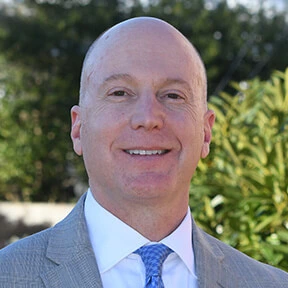
Dr. Weber is an adjunct Associate Professor in ATSU’s Doctor of Medical Science program.
Dr. Weber holds several degrees, including an associate in applied business, a bachelor of science in management science, a master of business administration, a master’s in physician assistant studies, and a doctorate in health sciences from ATSU. He is also a licensed PA in the state of South Carolina with clinical experience in both emergency and psychiatric medicine.
Dr. Weber teaches Research Methods (Core Course) and Health Economics (Leadership Track). Dr. Weber has previously taught graduate level courses in research methods, biomedical ethics, and many other classes. He is extremely familiar with adult learning, course development, and assessment methods. Before becoming a PA, Dr. Weber was a computer engineer and has an extensive background in technology and medical simulation tools.
Dr. Weber currently teaches Research Methods in Healthcare and Health Economics (Leadership Track).

Kevin R. Kupferer, PA-C, DHSc, MsCI, MPAS
Assistant Professor
Kevin Kupferer, DHSc, PA-C, MsCI, MPAS is an adjunct Assistant Professor in ATSU’s Doctor of Medical Science program.
Dr. Kupferer is a 2005 graduate of the University of Nebraska/USAF Program at Ft. Sam Houston, San Antonio, Texas. His clinical background is in family medicine and urgent care. He is a Primary Care Provider and Clinical Researcher with the Phoenix Department of Veterans Affairs. He has over 10 years’ experience managing and conducting biomedical research and clinical trials for the Department of Defense and private sector.
Dr. Kupferer completed a residency in clinical research with a masters in clinical investigations at the University of Texas HSCSA and a doctorate in health science through ATSU in 2013. He is a member of the Arizona State Association of Physician Assistants (ASAPA), American Academy of Physician Assistants (AAPA), Society of Air Force PAs (SAFPA) and the Physician Assistant Education Association (PAEA).
Dr. Kupferer teaches Research Methods in Healthcare, Capstone I, II, and III.

Francis (Frank) Crosby Jr., DHSc, MPAS, PA-C
Adjunct Professor
Frank Crosby, Jr., DHSc, MPAS, PA-C is an adjunct Professor in ATSU’s Doctor of Medical Science program.
Dr. Crosby received his doctorate in health science (DHSc) from Nova Southeastern University (NSU) in 2013, his master’s in physician assistant studies from the University of Nebraska Medical Center in 1997, his bachelors as a physician associate from the University of Oklahoma in 1982, and a diploma from the Air War College, Air University in 1996. He retired from the United States Air Force in 2005 at the rank of lieutenant colonel.
Dr. Crosby currently teaches medical ethics in healthcare for NSU. He is a founding member and past- President of PAs for Tomorrow. During his military career, he served in multiple leadership roles including deputy chief of medical staff, commander of a medical operations squadron, and as an AF liaison to the Joint Commission. He brings a wealth of experience in leadership and health policy to the DMSc program.
Dr. Crosby enjoys world travels with his bride of 44 years and has logged nearly 1000 SCUBA dives as a master SCUBA diver. When not underwater, he is often on the ski slopes of Colorado. He will be teaching Determinants of Health, Quality Improvement in Healthcare, and Organizational Leadership Management & Behavior courses.
Dr. Crosby teaches Social & Behavioral Determinants in Health and Quality Improvement in Healthcare.

Michael Champion, DHSc, MPAS, MEd, PA-C
Adjunct Professor
Dr. Champion graduated from PA school in 1980 in Cleveland, Ohio. He went on to earn a BS degree from the University of the State of New York in 1983. While stationed in Berlin, Germany he earned a Master of Education from Boston University. He returned from Europe in 1987 to attend the Clinical Perfusion training program at Penn State Hershey with a second year of training at Walter Reed Medical Center in Washington, DC. In 1994, Dr. Champion earned the Master of Medical Science at St. Francis College (now University) in Loretto, PA. His doctoral degree was earned at Nova Southeastern University in 2004 at the Doctor of Health Sciences program in Fort Lauderdale, Florida. Additionally, he went on to earn an MBA from the Western Governors University program in 2015. Most recently, Dr. Champion has attended the Master of Science in Surgical Science and Practice program at Oxford University, where his dissertation is being considered for his graduation fulfillment. Of note, Dr. Champion is the only PA that has been accepted to the Oxford program as it has been designed for only surgeons and he will be the only non-surgeon this program has graduated.
Dr. Champion has a total of 35 years military service, starting as a private and finishing as a colonel. His professional interests are in trauma surgery, cardiac surgery and emergency medicine. He served as a past AAPA Surgical Congress chair, is a Distinguished Fellow of the AAPA as well as a Fellow Member of the APACVS. He has served as president of the AAPA Veterans Caucus, the Society of Army Physician Assistants and a number of committees at AAPA. He has authored a number of articles and a book on surgical assisting. Dr. Champion continues to work in surgery and emergency medicine as well as run three corporate entities.

Beth Poppre, EdD, MEd
Assistant Professor & Administrative Manager
Dr. Poppre joined ATSU in 2005 in Student Affairs. After 14 years of serving as the Assistant and Associate Vice President-Student Affairs, Dr. Poppre transitioned to the DMSc program as administrative manager. Dr. Poppre is dedicated to providing excellent student service and helping the DMSc students navigate, succeed, and graduate. Dr. Poppre earned her master’s degree in student affairs Arizona State University and her doctorate degree in educational leadership from Grand Canyon University (online).
Dr. Poppre teaches Foundations of Doctoral Studies.

Trenton Honda, PhD, MMS, PA-C
Clinical Professor
Dr. Trent Honda is also a clinical professor and associate dean of the School of Clinical and Rehabilitation Sciences (SoCRS) at Northeastern University, a Carnegie R1 research institution. His research falls into two general thematic areas: epidemiology, and biomedical education. Within epidemiology, his work focuses on identifying and quantifying the health effects of air pollution, epidemics, and the built environment. Within biomedical education, he regularly publishes and presents on student and program evaluation, application of quantitative methods in biomedical education research, and disparities in physician assistant education.
He also currently serves as the Editor in Chief of the Journal of Physician Assistant Education, and Guest Editor of Toxics, an international environmental epidemiology journal.
He has a long history of graduate-level teaching in human physiology and research design, and have mentored PhD students at University of Sydney, George Washington University, and Northeastern University, among others. His clinical background includes many years of primary care in underserved communities, as well as occupational medicine, and urgent care.
Dr. Honda teaches the Capstone courses.

Brian Nordgren, DHSc, MPH, PA-C, DFAAPA
Clinical Professor
Dr. Brian Nordgren graduated as a PA from Nova Southeastern University in 2002 and has practiced medicine in various areas including surgery, malignant hematology and cardiology. He worked as an adjunct PA professor in Florida and North Carolina teaching both lectures and clinical rotations. He has worked both clinically and administratively within healthcare organizations.
Currently he is working in cardiology (electrophysiology) in Michigan. Dr. Nordgren received his doctorate in Health Science from Nova Southeastern University in 2011. He is published in the areas of hematology, cardiology and has been involved with clinical research most of his career.
Dr. Nordgren teaches the Capstone courses.

Gaspar Rosario, DHSc, PA-C
Physician Assistant

Melinda Rawcliffe, DMSc, PA-C
Physician Assistant
Dr. Melinda Rawcliffe has been in the medical field for 30 years and a PA for over 15 years. Melinda began her venture into medicine as an EMT, working for several years in the prehospital setting. Melinda pursued a bachelor's degree in business and consulted in the medical field for over a decade prior to attending PA school at ATSU in 2007. In 2021 Melinda took the next step, receiving a Doctorate of Medical Sciences in Leadership.
As a PA, Melinda has worked in reconstructive plastic surgery, pediatric and adult neurosurgery, and austere environment and emergency medicine. Melinda has worked in 6 countries, 2 war zones, oil exploration, as well as both on land and ocean-based projects in the arctic circle. Melinda discovered that there are always unique opportunities for PAs in rural, remote and austere environment medicine. Melinda is an associate professor for Franklin Peirce University’s Hybrid PA program, an adjunct faculty member and DMSc Capstone facilitator for the DPAS at A.T. Still University. She still enjoys precepting PA students in rural and remote emergency medicine.
Upon entering the academic field, Melinda began developing her ultrasound skills. While completing her doctorate, Melinda developed a curriculum for POCUS integration into PA education. She continues to consult with multiple entities on POCUS integration into rural, remote and austere environment medicine.
Melinda is the current president of the Arizona State Association of PAs and a representative to the AAPA House of Delegates. For the past eight years, Melinda has volunteered with the Flying Samaritans, providing healthcare in rural clinics in Baja of Mexico. Melinda also deploys with the Federal National Disaster Management Services, Az-1 DMAT team.
In her spare time, Melinda travels globally and enjoys scuba diving, flying a little Cessna 172, and spoiling her two grandchildren.
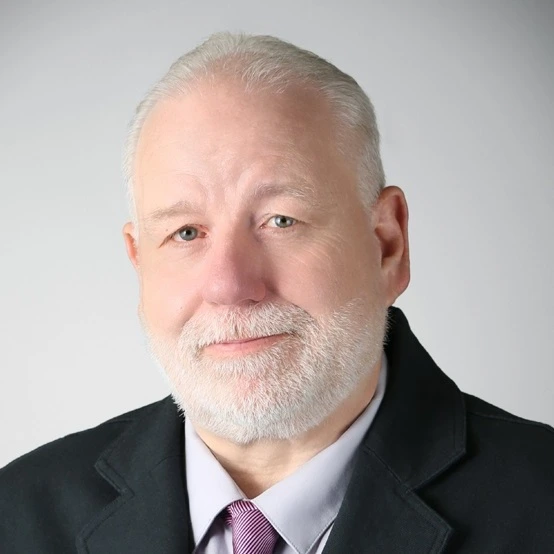
Tony Stephas, DHSc, PA-C
Associate Professor
Dr. Anthony Stephas completed his Doctorate in Health Science (DHSc) through A.T. Still University; his research focused on the knowledge and attitudes of practicing massage therapists regarding skin cancer screening. He obtained his Physician Assistant training from Kettering College of Medical Arts, graduating in 1991. He also holds a Master of Science degree in advanced physician assistant studies from A.T. Still University. He previously attended St. Paul technical college and Embry Riddle Aeronautical University.
Always committed to working with underserved populations, his first clinical position was in family practice at Sea Mar Community Health Center in Mount Vernon, Washington. In 1994 he began work at Yakima Valley Farm Workers Clinic in Toppenish, Washington, where he worked in urgent care. From 1999 until 2016, he worked at Central Washington Occupational Medicine, also in Toppenish. His current part-time clinical position is providing occupational medicine services and surveillance physicals to workers in the nuclear fuels industry.
Beginning in 2016, he began teaching as principal didactic faculty at the Physician Assistant Education Program at Heritage University in Toppenish, Washington. In that role, he taught various clinical subjects and chaired the Master's Research portion of the program.
He currently serves as Assistant Professor of Family Medicine at Pacific Northwestern University of Health Sciences, where he teaches humanism in medicine and is co-director of the clinical skills courses for the first and second-year D.O. students.
Before becoming a Physician Assistant, his medical experience included working as an EMT, Fleet Marine Force corpsman, and a respiratory therapist at the University of Minnesota Children's Hospital.
A licensed pilot and avid outdoor enthusiast with a lifelong interest in history, he currently lives and farms with his wife of 38 years on a small commercial cherry orchard in Central Washington.
Dr. Stephas teaches the Capstone courses.

Hailey Richins, MEd
Instructional Designer
Hailey received her Bachelor of Science in Management Information Systems from Utah State University and her Master of Education in Instructional Design and Educational Technology from the University of Utah. Hailey’s specialties are in adult learning and training in online learning environments and educational technology.

Beth Poppre, EdD, MEd
Assistant Professor & Administrative Manager
Dr. Poppre joined ATSU in 2005 in Student Affairs. After 14 years of serving as the Assistant and Associate Vice President-Student Affairs, Dr. Poppre transitioned to the DMSc program as administrative manager. Dr. Poppre is dedicated to providing excellent student service and helping the DMSc students navigate, succeed, and graduate. Dr. Poppre earned her master’s degree in student affairs Arizona State University and her doctorate degree in educational leadership from Grand Canyon University (online).
Dr. Poppre teaches Foundations of Doctoral Studies.
Tuition and fees
Review tuition and fees for the Doctor of Medical Science program. Please note tuition and fees are subject to change. Tuition discounts are available for full-time ATSU employees, ATSU alumni, military veterans and active service members, and employees of community health centers partners. Contact the admission’s office for details.
Financial aid
Federal financial assistance is available for qualifying students. For information on financial aid, visit Enrollment Services or contact them at 660.626.2019 or by email at enrollmentservices@atsu.edu.
Admissions
The admissions process for the Doctor of Medical Science program includes specific requirements for domestic and international applicants, as well as those pursuing advanced standing. Prospective students should review these criteria to ensure a complete application.
General admissions requirements
The Doctor of Medical Science program is designed to be a postgraduate program for PAs who are, or have previously been certified or licensed to practice as a PA. Persons eligible to matriculate in this program must satisfy all of the following criteria:
- The applicant is a currently certified/licensed physician assistant or, if retired, previously certified/licensed to practice as a PA.
-
Completion of a master’s degree from an accredited university recognized by the Department of Education.
- Applicants who graduated from a university outside the United States may be required to provide a degree equivalency evaluation.
- PAs without a master’s degree may be eligible for the master’s equivalency option. See below for equivalency requirements and contact an Enrollment Counselor for additional information.
- Candidates must have achieved a minimum overall graduate cumulative GPA of 3.0 (on a 4.0 scale).
-
The applicant must submit transcripts from qualifying degree institution(s), to include at least:
- Transcript showing completion of physician assistant program of study
- Transcript showing completion of a graduate degree (if physician assistant program did not confer a graduate degree)
-
Applicants who have graduated from a foreign college or university should submit acceptable evidence of U.S. degree/course equivalency. All course work taken at the foreign institution must be evaluated for American institution equivalence by one of the following services:
-
World Education Services
P.O. Box 5087 Bowling Green Station
New York, NY 10274-5087
P: (212) 966-6311 | F: (212) 739-6139
-
Josef Silny & Associates, Inc. International Education Consultants
7101 SW 102 Avenue
Miami, FL 33173
P: (305) 273-1616 | F: (305) 273-1338
-
Educational Credential Evaluators, Inc.
P.O. Box 514070
Milwaukee, WI 53203-3470
-
Intl. Education Research Foundation, Inc.
PO Box 3665
Culver City, CA 90231-3665
-
American Assn. of Collegiate Registrars & Admissions Officers
One Dupont Circle, NW, Suite 520
Washington, DC 20036-1135
-
World Education Services
-
The applicant must complete an admissions application, to include at least:
- A current and comprehensive curriculum vita
- Non-refundable application fee
-
The applicant must be fluent in English (the language of instruction of this program). When the applicant speaks and/or writes in English as a second language, the applicant must submit Test of English as a Foreign Language (TOEFL) scores for review.
- Acceptable minimal TOEFL scores for ATSU-ASHS applications are:
- Internet-based total score = 80
- Acceptable IELTS score is an overall band score of 6.5
- Applicants who speak and/or write English as a second language who have previously graduated from a college or university accredited by the U.S. Department of Education with a bachelor’s degree (or higher) are exempt from this requirement.
- Applicants who believe the TOEFL requirement should be waived may petition the Physician Assistant Department chair in writing.
- The applicant must be able to meet University technology requirements during the entirety of the doctoral program.
Master’s equivalency option
To meet the master’s equivalency the PA applicant MUST have a bachelor’s degree in physician assistant studies AND meet and document in a portfolio at least one (1) of the criteria below:
- An approved military or civilian post-professional PA residency or fellowship
- An approved medical specialty certificate program (e.g. public health certificate)
- A Certificate of Added Qualification (CAQ) offered by the NCCPA
- At least 15 credit hours of post-secondary education toward a master’s degree
- Currently certified by the NCCPA with a minimum of at least ten years of continuous certification maintenance
Canada and U.K. admission requirements
The DMSc program welcomes PAs from Canada and the United Kingdom to apply. Canadian and U.K. applicants must be a currently certified/licensed physician assistant/associate or, if retired, previously certified/licensed to practice as a PA.
- Physician Assistant/Associates (PAs) practicing in Canada and the U.K. are eligible to apply if they graduated from a PA master’s program, accredited by the appropriate governmental, regional, or institutional body, and have successfully passed that respective country’s national certification examination.
- Please note: Non-U.S. trained PAs, who graduate from the DMSc program, do NOT qualify to be certified by the NCCPA. According to the current United States Accreditation Review Commission on Education for the Physician Assistant (ARC-PA) requirements, “To practice as a PA in the United States one must graduate from an ARC-PA accredited program and be certified by the NCCPA.” Learn more at arc-pa.org.
- PAs without a master’s degree may be eligible for the master’s equivalency option:
- An approved military or civilian post-professional PA residency or fellowship.
- At least 15 credit hours of post-secondary education toward a master’s degree.
- Applicants must be fluent in English (the language of instruction of this program). When the applicant speaks and/or writes in English as a second language, the applicant must submit Test of English as a Foreign Language (TOEFL) scores for review. Applicants who believe the TOEFL requirement should be waived may petition the Physician Assistant Department chair in writing.
Advanced Pathway available for new PA graduates
PAs who graduated from a master’s PA program within the last seven years, or PAs who completed a one-year PA residency or fellowship, are eligible to receive up to 12 transfer credits toward ATSU’s Doctor of Medical Science (DMSc) degree. This equates to a tuition savings of 33%!
Eligible students will only need to complete nine of the required 13 DMSc courses. Therefore, students can complete the DMSc program in just 15-22 months, taking either one or two classes at a time.
Contact enrollment services today for more information.
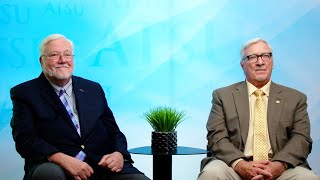
ATSU-ASHS’ PA Alumni Earn an Exclusive Discount and Advanced Standing for the DMSc
ATSU alumni-exclusive benefits
Alumni of ATSU’s Master of Science in Physician Assistant Studies programs enjoy a 20% alumni discount along with all the advantages of the Advanced Pathway into the DMSc program, resulting in nearly 50% savings on total tuition!
Learn more about the additional benefits by watching this informative video from Dr. Randy Danielsen and Dr. Albert Simon.
Careers and outcomes
Students in ATSU-ASHS’ exclusive post-professional online physician assistant doctorate are practicing physician assistants who want to advance their careers in many exciting areas of healthcare.
This program can help prepare you to be a:
- Clinical Practice PA
- PA Educator
- PA Administrator
- Global Health PA
- Public Health PA
- Sports Medicine PA
Students, alumni, and industry experts
The DMSc program offers a highly flexible online learning experience, allowing students to minimize career disruption while maximizing opportunities to apply their lessons directly to their work settings. This approach not only enhances their current roles but also accelerates career advancement. Explore the impressive accomplishments and publications of our DMSc students, and follow their success stories in PA Life Moments. Additionally, don’t miss our monthly DMSc Masterclass, featuring influential PAs who share their inspiring healthcare journeys and insights for success.
Hear from our students and alumni
From white coats to graduation caps
Students and graduates reflect on their experience at ATSU with unforgettable moments and milestones.

PA Life Moments
Our students and alumni share how ATSU’s program is empowering their practice.
Frequently asked questions
The Professional track allows students to customize a clinical learning plan with structured learning experiences to develop additional medical knowledge and skills. In each of the four courses of the practicum the learner submits a Learning Plan. The Learning Plan proposal defines the goals and outcomes the learner will achieve by the end of the four-course sequence. The practicum courses provide a blank canvas that allows the student to tailor the Learning Plan to their area of interest.
The DMSc program is a semester-based program (Fall: July-December and Spring: January-May). Each 20-week semester is broken into two (2) ten (10) week course blocks: Fall = Fall Block 1 (July-September) and Fall Block 2 (October-December); Spring = Spring Block 1 (January-March) and Spring Block 2 (March-May). Each DMSc course is 10-weeks in length.
New students can start the program on any of the four block start dates (January, March, July, and October). Tuition is due at the start of each semester (July and January); students must pay the full tuition/fees for all courses taken during the semester (i.e. all courses taken in Fall Block 1 and Fall Block 2 must be paid on the first day of the fall semester). View the academic calendar for more details.
In general, students should expect to spend around 6 to 8 hours per week on a DMSc 3-credit hour online course. This time includes watching lectures, completing readings, participating in online discussions, and completing assignments. However, the exact amount of time needed can vary depending on the course content and the individual student’s learning style and abilities. It is important for students to carefully review the course syllabus and schedule to plan their time effectively and stay on track throughout the instructional block.
The Doctor of Medical Science degree program at ATSU is designed to be completed by students who are working PAs. The program is specifically structured to accommodate the needs of busy PAs and is intended to be manageable for students who are working full time.
However, pursuing a doctoral degree while working full time can still be challenging and may require careful time management and dedication. Students in the DMSc program are typically expected to devote a significant amount of time each week to their coursework, research, and other program requirements. It is important for students to carefully assess their own abilities and commitments to determine if they will be able to effectively balance their academic and professional responsibilities while enrolled in the program.
It is also recommended that prospective students reach out to the program faculty or admissions at A.T. Still University for more specific information and guidance on managing the program while working full time.
A Doctor of Medical Science degree with a concentration in leadership or education can open up a range of career opportunities in the healthcare field. Some possible positions that graduates with these concentrations may pursue include:
- Healthcare executive or administrator: Graduates with a concentration in Leadership may be well-suited for roles as healthcare executives or administrators. These professionals are responsible for overseeing the operations of healthcare organizations, managing staff, developing strategic plans, and ensuring regulatory compliance.
- Director of medical education: Graduates with a concentration in Education may be qualified to work as directors of medical education in healthcare institutions or academic settings. These professionals oversee the development and implementation of medical education programs, curriculum design, and assessment of student learning outcomes.
- Clinical educator: Graduates with a concentration in Education may also pursue roles as clinical educators, providing instruction and training to healthcare professionals in clinical settings. Clinical educators may develop and deliver continuing education programs, mentor students and staff, and assess the competency of healthcare providers.
- Healthcare consultant: DMSc graduates with concentrations in Leadership or Education may also work as healthcare consultants, providing expertise and guidance to healthcare organizations on issues related to leadership development, education and training, quality improvement, and organizational efficiency.
- Researcher or scholar: Graduates with a DMSc degree may also pursue careers in research or academia, conducting scholarly research in healthcare leadership, education, or related topics, and publishing their findings in academic journals or presenting at conferences.
- Medical science liaison: PAs with a DMSc degree can pursue a career as a medical science liaison (MSL) in the pharmaceutical industry. MSLs are typically healthcare professionals, such as physicians, pharmacists, nurses, or other advanced practice providers, who are responsible for building and maintaining relationships with key opinion leaders (KOLs), healthcare providers, and researchers within the medical and scientific community.
Overall, a Doctor of Medical Science degree with concentrations in Leadership or Education can equip graduates with the knowledge and skills needed to excel in leadership positions, educational roles, and other healthcare-related careers that require advanced expertise in these areas.
No, but we would LOVE to see you at the program’s graduation ceremony in September! This is a great opportunity to connect with ATSU faculty and peers that you have studied with throughout the program.
Accreditation
A.T. Still University of Health Sciences is accredited by the
Higher Learning Commission
230 S. LaSalle Street, Suite 7-500,
Chicago, IL 60604
Phone: 800.621.7440
Fax: 312.263.7462
Email: info@hlcommission.org
Web: hlcommission.org



